Past Winners of the Gene E. & Adele R. Malott Prize for Recording Community Activism
Past Winners of the David J. Langum Sr. Prizes
2023 | 2022 | 2021 | 2020 | 2019 | 2018 | 2017 | 2016 | 2015 | 2014 | 2013 | 2012 | 2011 | 2010 | 2009 | 2008 | 2007
2006 | 2005 | 2004 | 2003 | 2002 | 2001
For the year 2023
The Winner of the 2023 David J. Langum, Sr. Prize in American Legal History is Before the Movement: The Hidden History of Black Civil Rights, by Dylan C. Penningroth


In this capaciously conceived study, Dylan Penningroth looks beyond the familiar narrative of the post-Civil Rights Movement to explain how Blacks used the law in their daily lives to promote their rights, going back as far as the era of slavery. His meticulous research, which draws upon the archives of his own family, demonstrates how Blacks effectively made use of the the law of contracts, property, tort, domestic relations, and inheritance. By providing a more expansive and nuanced understanding of Black freedom, Before the Movement is a transformative achievement. – D.S.
For the year 2022
The winner of the 2022 David J. Langum, Sr. Prize in American Historical Fiction is Mercury Pictures Presents, by Anthony Marra
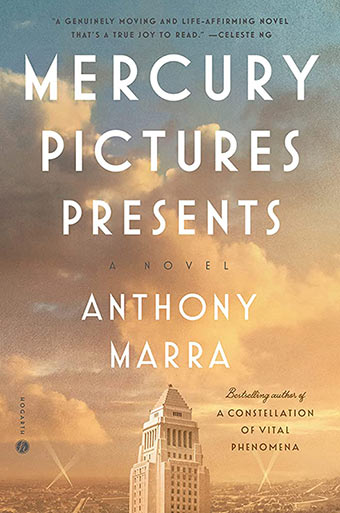

Anthony Marra’s gripping Mercury Pictures Presents explores an unusual and carefully researched perspective into World War 2. Split between Hollywood and an Italian prison camp, the novel follows several interconnected lives at the point when America is just about to enter the war and shortly after. At the centre is Maria Lagana, an Italian political prisoner’s daughter and ambitious associate producer for a B-movie studio, “a job that demanded the talents of a general, diplomat, hostage negotiator, and hair-dresser”. The novel plays with viewpoint, surveillance and artifice. In a sudden reversal, Mercury Pictures shifts from defending itself in Congressional hearings about promoting pro-war messages to producing propaganda films for the War Department. Ultimately, they combine enemy propaganda and scenes produced in the studio rather than actual footage as “soundstage skirmishes look more realistic than the real ones”. While covering a full cast and wide geographic scope, Marra creates richly realized characters in vivid prose. Throughout, the story is comic, absurd and touching. – V.L.
– – – – –
The finalist of the 2022 David J. Langum, Sr. Prize in American Historical Fiction is The Magic Kingdom, by Russell Banks
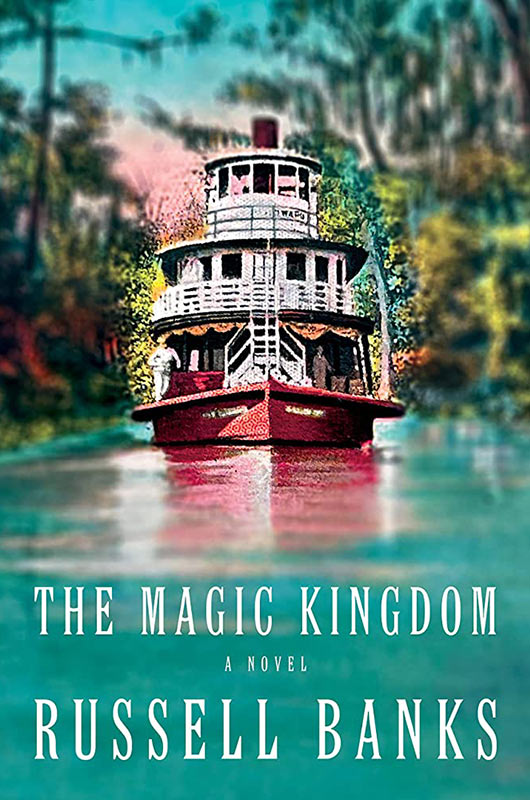

The protagonist, Harley Mann, then an eccentric and somewhat crotchety old man, dictated these fictional memoirs into a tape recorder on the porch of his modest home in St. Cloud, Florida. Mann’s early years were spent with his family in an Indiana Ruskinite commune. The father’s ideological differences caused the family to move. This rigid adherence to principle ultimately hurt his son, Harley, as well. They settled in Florida in miserable conditions. The father then died, and Mann’s mother made a connection with a Shaker colony, New Bethany, located in the general vicinity of the present-day Disney World.
They arrived in New Bethany in 1902, and Mann grew into early adulthood there as a trusted young man who could not formally become a Shaker until he was 21. At age 12 he met Sadie Pratt, a sufferer from consumption and who lived at a hospital colony near New Bethany. When the hospital collapsed financially, she moved to New Bethany. Mann gradually fell into an obsessive love for Sadie, and after she moved to New Bethany they became lovers. We know that Pratt was attractive and about six years older than Mann, but not much else. Although one might ordinarily think of her as an undeveloped character, we must bear in mind that the entire affair is told, long after the fact, by an old man recalling an obsessive love. Pratt’s condition turns to the worse, and she dies, in a tangle of circumstances that result in Pratt’s accusation to the authorities that the leading elders over-administered her morphine. In turn, this leads the Shaker community to shun their accuser.
It is unusual that an historical novel dwells on the Shakers, but here they are given full attention, showing their beliefs, rituals, and practices. Another feature of the book, also fresh, is its consideration of riverboats as the usual method of transportation in middle Florida in the early 20th century. The book is engaging, and the narrative voice holds the reader well. – D.J.L. Sr.
– – – – –
The Winner of the 2022 David J. Langum, Sr. Prize in American Legal History is The Sewing Girl’s Tale: A Story of Crime and Consequences in Revolutionary America by John Wood Sweet
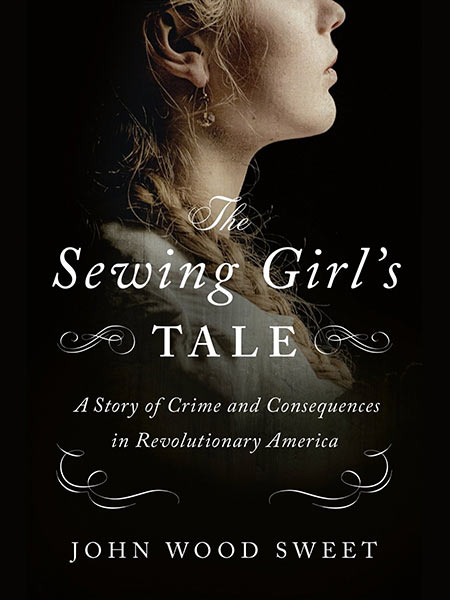

In this riveting and exhaustively researched account of one of the first rape trials, The Sewing Girl’s Tale brilliantly surveys the intersection of gender and class biases in its vivid portrayal of the social, cultural, and economic life of 1790s Manhattan and exposes the tensions between the democratic ideals of the new republic and the persistence of oppression of women and the working classes. In recreating the long-ago world of Lanah Sawyer, the aggrieved seamstress, John Wood Sweet provides an inspiring example of how disadvantaged persons can challenge injustices and shape their destinies in the face of great obstacles. – W.G.R.
– – – – –
The Finalist of the 2022 David J. Langum, Sr. Prize in American Legal History is Democratic Justice: Felix Frankfurter, the Supreme Court, and the Making of the Liberal Establishment by Brad Snyder
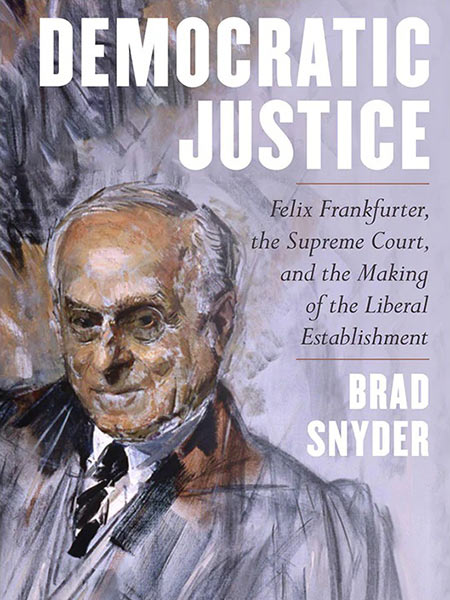

In his exhaustively researched, deftly written, and timely biography of Felix Frankfurter, Brad Snyder helps us make sense of an often misunderstood and mischaracterized member of the modern Supreme Court. At a moment when the Court holds far less promise as an engine of social reform, Democratic Justice: Felix Frankfurter, the Supreme Court, and the Making of the Liberal Establishment paints a picture of a jurist whose ideology we are only now more fully equipped to appreciate. – D.S.
For the year 2021
The winner of the 2021 David J. Langum, Sr. Prize in American Historical Fiction is Ridgeline, by Michael Punke
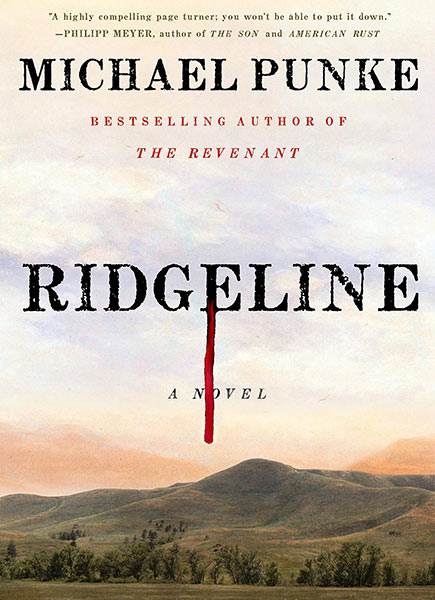

This is the story of a battle that delivered the U.S. Army its second largest loss of the Indians Wars, exceeded only by Custer’s debacle at the Little Big Horn. American accounts commonly refer to this as the Fetterman Fight or Fetterman massacre, occurring near Fort Phil Kearny in Wyoming. The local Indian tribes in a rare example of co-operation assembled over 1,000 warriors, and then used a strategy of decoy to lure about 80-100 American soldiers into a tight canyon around which the Indian warriors were hidden. Using a clever system of signals, the Indians were able to charge the Americans at a single instant and annihilate them.
It is more than just a war story in that the author carefully covers the Indian motivations. Well-told through fiction, entire chapters cover their historical grievances that led to this particular encounter and their careful planning. It is well-written and loaded with history, from both the American and the Indian perspectives. The book is an even-handed work of excellent fiction, loaded with history brought out in the narrative without being in the least bit pedantic or tendentious. A skillful job. – D.J.L., Sr.
– – – – –
The finalist of the 2021 David J. Langum, Sr. Prize in American Historical Fiction is When the Stars Rain Down, by Angela Jackson-Brown
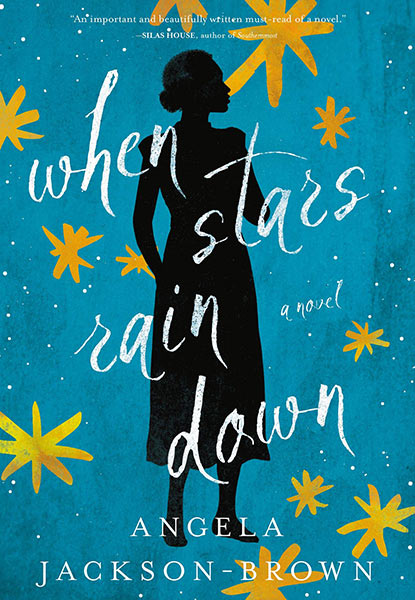

When the Stars Rain Down is a coming-of age story set in small-town Georgia in the 1930s. The summer heat is oppressive, as is the sense of foreboding for teenager Opal. Opal lives in “Colored Town,” an enclave of African-American residents of the fictional town Parsons. With her grandmother, Opal works as a housekeeper for a family she has known for her entire life and considers family. However, the strength of this bond is tested during several horrific incidents of racial violence in the town. These events force Opal to examine her relationship with her employers and community. In a simple and absorbing style, the novel draws the reader into Opal’s rich and complex inner life as she negotiates romance, religion and emotional labor and pain. With its tightly drawn historical context and characters, When the Stars Rain Down is a timely book. – V.L.
– – – – –
The Winner of the 2021 David J. Langum, Sr. Prize in American Legal History is Traveling Black: A Story of Race and Resistance by Mia Bay
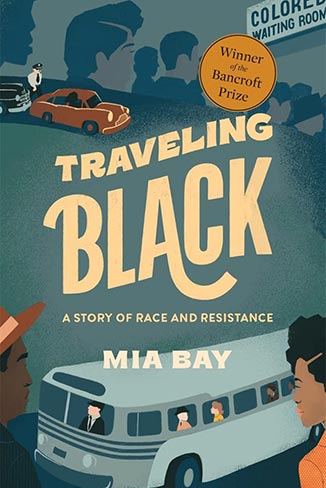

“American identity has long been defined by mobility and the freedom of the open road, but African Americans have never fully shared in that freedom,” Mia Bay writes in her extraordinary, elegant, and moving new book. From stagecoaches and steamships to trains, planes, and automobiles, travel throughout the nation has been the site of racial discrimination and African American resistance. Bay brilliantly demonstrates how travel became the flash point for racial conflict and reminds us how many Rosa Parks preceded Rosa Parks. This superbly researched story takes us beyond the courtroom to the actors who agitated to end segregation in transportation and demonstrates the changing–and continuing–ways they navigated race and shared space. Brava! – L.K.
– – – – –
The Finalist of the 2021 David J. Langum, Sr. Prize in American Legal History is Vice Patrol: Cops, Courts, and the Struggle over Urban Gay Life before Stonewall by Anna Lvovsky
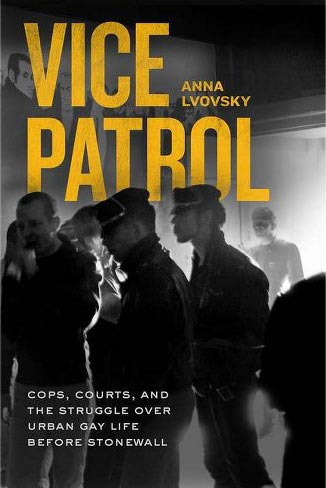

In this wide-ranging and imaginative study, Anna Lvovsky centers the law’s confrontation with gay life in the United States in the mid-20th century, training her eye on criminal justice at the local level. Lvovksy illuminates the tensions between, on the one hand, state liquor agencies established post-Prohibition and the newly-formed vice patrols of local police forces, and, on the other hand, state trial courts, where judges exercised discretion to temper what they viewed as bureaucratic and law enforcement excesses. While this story alone would render Vice Patrol an important addition to our burgeoning history of the American criminal justice system, the study is all the more important for a larger dynamic Lvovsky’s study reveals: that the project of policing gay life prior to Stonewall was not simply a contest over sexual practices or public conduct, but also was the site of an institutional struggle over the boundaries of the criminal justice system itself. – D.S.
For the year 2020
The Winner of the 2020 David J. Langum, Sr. Prize in American Historical Fiction Is The Cold Millions by Jess Walter


Jess Walter’s The Cold Millions is a novel of the burgeoning Pacific Northwest that presents history through an engaging storytelling voice brimming with both humor and pathos. In the early 20th Century, Ryan “Rye” Dolan, a 16-year-old orphan, sets off from Montana in search of his older brother, Gregory (Gig). Finally reuniting in Washington state, Rye and Gig ride the rails, attempting to make ends meet amidst obstacles that include ruthless employers, corrupt job agencies, and Gig’s less than responsible approach to life. This approach leads Gig to join a group of idealists and later the Industrial Workers of the World. Rye is less than taken with the unions, which he sees as a sure-fire ticket to jail and beatings from local law enforcement. Despite his misgivings, Rye is pulled into the middle of the workers’ rights struggle when a beautiful young activist (the historical Elizabeth Gurley Flynn), travels to Spokane to stir things up. In a desperate attempt to free Gig from imprisonment for his union activities, Rye is forced into a devil’s bargain with a dangerous mining magnate. The history of this period of labor unrest is woven seamlessly into the plotting, allowing The Cold Millions to illuminate an era that is often overlooked. Walter’s characterization and multiple narrative perspectives, from Pinkertons to burlesques, add even more color to an already vibrant portrayal of the tramp lifestyle amid the industrialization of the Pacific Northwest. The result is an entertaining and riveting read. – B.L.
– – – – –
Finalist for the 2020 David J. Langum, Sr. Prize in American Historical Fiction Is The Book of Lost Light by Ron Nyren (Black Lawrence Press, 2020)
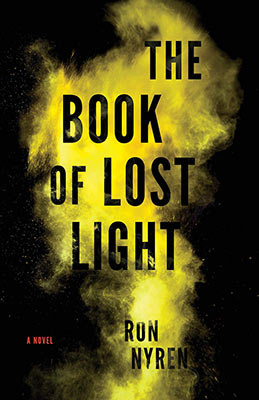

Set in San Francisco and surrounding areas at the turn of the 19th century, this novel portrays the activities of an eccentric tiny family. The father, Arthur, is a portrait photographer, mechanical genius, and a somewhat unstable man. His wife died in the childbirth of their son Joseph, and the family is saved by the arrival of Arthur’s orphaned niece. She herself is a bit eccentric, but stable enough to keep Arthur in reality and to serve as a surrogate mother to Joseph. Arthur has some peculiar theories about the nature of time, and how he might capture the essence of time by taking a photograph of his unclothed son, Joseph, in the same pose at the exact same time of each and every day. The dynamics between father and son form the heart of this novel, and the reader can anticipate the time when Joseph as an adolescent ultimately rebels.
The prose is engaging and the descriptive passages illuminative. We read a vivid description of the San Francisco earthquake and its effects on the everyday citizenry of San Francisco. There is much here on the history of photography. Before Joseph was born, Arthur worked for Eadweard Muybridge, an actual historical person, at his experiments with the photography of motion that he conducted at Leland Stanford’s farm. There is considerable discussion of Muybridge and his and other early photographers’ work, and this gives the reader a good sense of the period and a feel for technological innovation in photography during this period. The book feels fresh. – D.J.L., Sr.
– – – – –
The Winner of the 2020 David J. Langum, Sr. Prize in American Legal History is Sara Mayeux’s Free Justice: A History of the Public Defender in Twentieth-Century America (University of North Carolina Press, 2020). Mayeux is associate professor of law and associate professor of history at Vanderbilt.
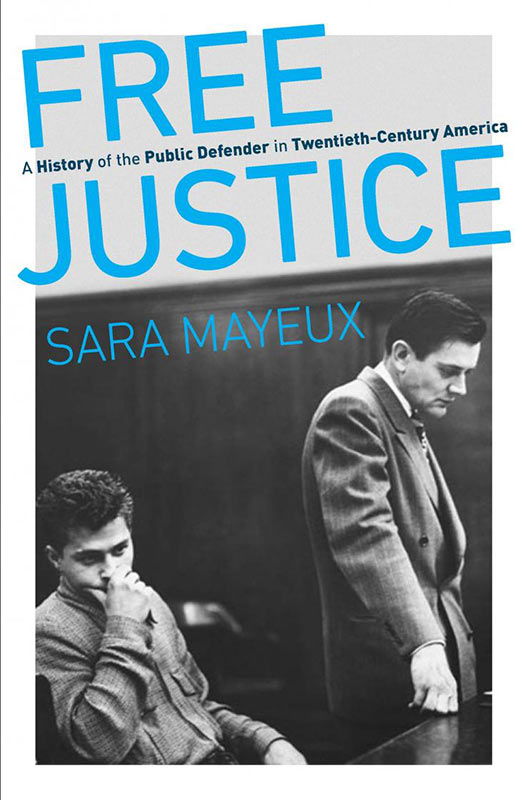

This important, beautifully written book explores the emergence of the public defender during long Progressive era, a time when the United States faced the same paradox of poverty amid progress and wealth against commonwealth that it confronts today. The idea took wings even though white-shoe lawyers considered indigent criminal defense a job for private charity and equated public defense with socialism and totalitarianism. As was so often the case, the Cold War turned everything upside down. By the mid-twentieth century, elites had repurposed the public defender as a weapon of anticommunism, a way of showing American law’s special respect for individual rights—a way of vindicating the constitutional rights of defendants, especially the right to counsel that the Warren Court supposedly guaranteed in Gideon v. Wainwright. Mayeux powerfully challenges the standard interpretation that states were moving towards establishing public defender offices in the North and West and that Gideon accelerated that movement only in the South, where white supremacy reigned. She shows us how Gideon transformed the provision of legal services to criminal indigents across the United States—not always for the better. A big book that shows the legal profession and public defenders shaping and being shaped by society, Free Justice is neither a feel-good story nor another “lost promise of Gideon and the Warren Court” account. Mayeux brilliantly shows us roads not taken, highlights contingency, and shows us how matters might have turned out differently. And in reminding us of that, she enables us to imagine a more hopeful future. – L.K.
– – – – –
The Finalist of the 2020 David J. Langum, Sr. Prize in American Legal History is Richard B. Bernstein’s The Education of John Adams (Oxford University Press, 2020). Bernstein is an adjunct professor at New York Law School.
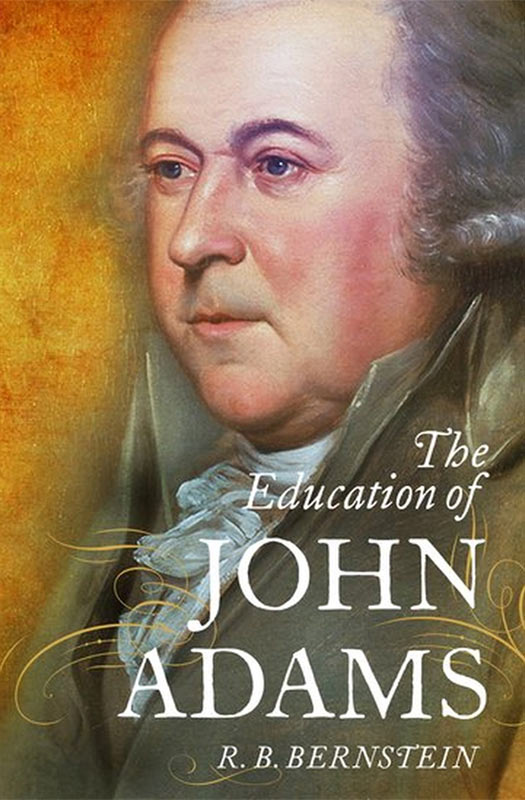
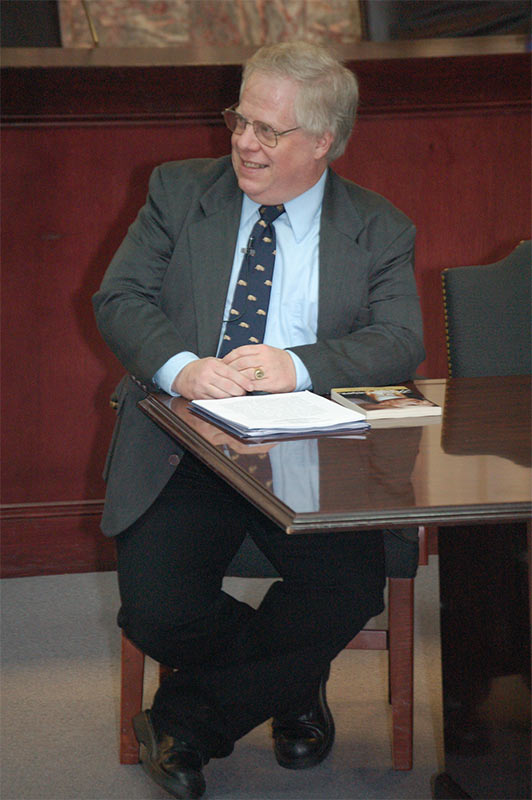
For the year 2019
The Winner of the 2019 David J. Langum, Sr. Prize in American Historical Fiction Is Mark Barr for Watershed (Hub City Press)
 Reading Mark Barr’s Watershed is an immersive historical experience, a pitch-perfect evocation of a time, a place, and a culture. In the midst of the Depression, engineer Nathan McReaken attempts to evade a ruinous past. He arrives in a small Tennessee town to seek a new start building the federal dam nearby, an endeavor that will bring life-altering electrification to the homes of the valley’s rural inhabitants. There he meets Claire Dixon, a housewife attempting to forge a different path after estrangement from her husband. The dam provides new opportunities for Claire as well; she finds work convincing local households to sign on to an electricity co-operative. Nathan’s feelings for Claire deepen and Claire’s ambitions for her life shift, but forces beyond either’s control threaten all they have tentatively begun to build.
Reading Mark Barr’s Watershed is an immersive historical experience, a pitch-perfect evocation of a time, a place, and a culture. In the midst of the Depression, engineer Nathan McReaken attempts to evade a ruinous past. He arrives in a small Tennessee town to seek a new start building the federal dam nearby, an endeavor that will bring life-altering electrification to the homes of the valley’s rural inhabitants. There he meets Claire Dixon, a housewife attempting to forge a different path after estrangement from her husband. The dam provides new opportunities for Claire as well; she finds work convincing local households to sign on to an electricity co-operative. Nathan’s feelings for Claire deepen and Claire’s ambitions for her life shift, but forces beyond either’s control threaten all they have tentatively begun to build.
Barr effortlessly contrasts the cultural perspectives of urban-bred engineers and bureaucrats with that of the valley’s local population. The historical context paints a vivid picture of the advent of electricity, the anticipation of how its introduction would change fundamental daily rhythms from time out of mind. The sense of place, from the sticky Southern heat to the cornbread and butter beans, is wholly authentic. Conveyed in prose that simply but effectively illuminates, Watershed would be an accomplishment for any author, and is especially remarkable as a historical fiction debut. – B.L.
– – – – –
Finalist for the 2019 David J. Langum, Sr. Prize in American Historical Fiction Is The Glovemaker, by Ann Weisgarber
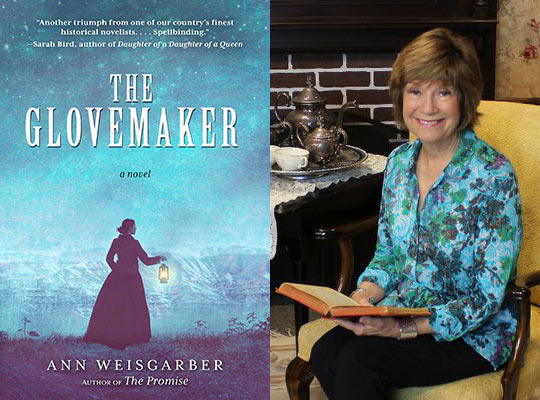 Ann Weisgarber’s The Glovemaker is set in the late 1880s in the Utah territory. The novel captures both the beauty and peril of the natural environment in which the protagonist Deborah lives in a small community of Mormons. While Deborah and her neighbors live outside the official teachings of the Church and do not practice polygamy, fear and memory of Mormon persecution guides their practice of assisting Mormon fugitives. One of these fugitives threatens to break the community apart. With quiet and economical prose, the novel is clear and confident about the “in-between” world it depicts. – V.L.
Ann Weisgarber’s The Glovemaker is set in the late 1880s in the Utah territory. The novel captures both the beauty and peril of the natural environment in which the protagonist Deborah lives in a small community of Mormons. While Deborah and her neighbors live outside the official teachings of the Church and do not practice polygamy, fear and memory of Mormon persecution guides their practice of assisting Mormon fugitives. One of these fugitives threatens to break the community apart. With quiet and economical prose, the novel is clear and confident about the “in-between” world it depicts. – V.L.
– – – – –
Finalist for the 2019 David J. Langum, Sr. Prize in American Historical Fiction is American Princess: A Novel of First Daughter Alice Roosevelt, by Stephanie Marie Thornton
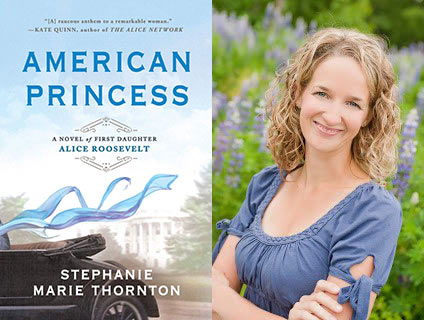 This is a fictional biography of a fascinating woman, Alice Roosevelt Longworth, daughter of Teddy Roosevelt and doyenne of Washington’s social/political life for decades.
This is a fictional biography of a fascinating woman, Alice Roosevelt Longworth, daughter of Teddy Roosevelt and doyenne of Washington’s social/political life for decades.
I generally do not care for fictional biographies because, as an historian, I keep asking myself “how much of this stuff is real?” I never have that perplexing question for novels that I know are entirely made up. Here, however, in an author’s note at the end, Thornton goes to a considerable extent to explain what events she altered a bit, and a few things she made up entirely. And these are not that many.
It is a lively and fascinating read, written in Alice’s own voice, that describes a very raucous and forceful woman, uninhibited to the extent she had an illegitimate child with a married Senator, with whom she was having an affair whilst she herself was married to the Speaker of the House. Thornton is able to use the events of this affair and resulting love child, and other events as well, to build up more dramatic tension than is usual for a biography.
Because Alice Roosevelt Longworth was personally acquainted with many political and business leaders of the world, and because throughout the adult years of her 96 year life she was often involved in considering issues at very high levels, the book is loaded with history, mostly political history but also economic and social history. As the biography is organized chronologically, the history we are given is chronological rather than the analytical history – how things were socially and politically at any given time or place – most common to historical fiction. – D.J.L., Sr.
– – – – –
The Winner of the 2019 David J. Langum, Sr. Prize in American Legal History is Sarah A. Seo for her Policing the Open Road: How Cars Transformed American Freedom.
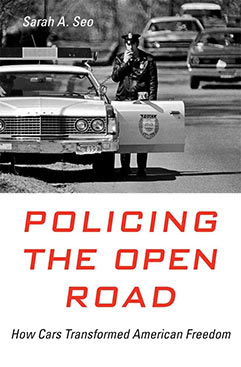

Sarah Seo’s Policing the Open Road: How Cars Transformed American Freedom is an inventive interweaving of technology, society, and criminal procedure that reveals a paradox formerly unacknowledged but so obvious once pointed out: at the same time that the mass-produced automobile brought unprecedented mobility to a wide swath of American society, it also subjected people to an unimaginable level of government authority, utterly reworking the meaning of freedom in the United States. Seo’s sweeping account takes us from the beginnings of traffic enforcement, as police departments were transformed from foot patrols to motor cops; through Prohibition, where the automobile played a vital role in the cat-and-mouse game of liquor control and the Fourth Amendment’s protection against unreasonable searches began to be riddled with exceptions; to the modern era, when the phrase “driving while black” emerged to expose a racialized policing of automotive conduct that in fact continued unabated from the Jim Crow Era to the 21st century. This is a book that scholars will admire for its creativity and careful research, while lay readers will never look at getting behind the wheel in the same way again. – D.S.
– – – – –
The Finalist of the 2019 David J. Langum, Sr. Prize in American Legal History is Jessica K. Lowe for her Murder in the Shenandoah: Making Law Sovereign in Revolutionary Virginia.
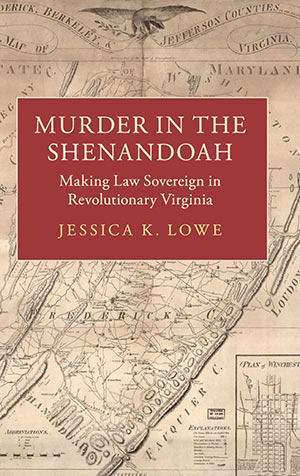

This beautifully written book is history in a grain of sand writ large. Jessica Lowe masterfully transforms a brawl and homicide into a prism on post-Revolutionary Virginia’s legal system already rife with “tense discussion about what it meant to make law ‘king.’” Murder in the Shenandoah is narrative history and legal history at its finest. Brava! – L.K.
For the year 2018
The Winner of the 2018 David J. Langum, Sr. Prize in American Legal History is Black Litigants in the Antebellum South, by Kimberly M. Welch (North Carolina).
 Welch’s meticulous research into obscure and tattered court records of the antebellum American South has yielded some surprising results. The title would encompass freedom suits of blacks wrongfully held as slaves and also criminal suits against slaves. Freedom suits are discussed, but her focus is on free persons of color suing whites, for debts, breach of contract, back wages, and the entire range of civil liability.
Welch’s meticulous research into obscure and tattered court records of the antebellum American South has yielded some surprising results. The title would encompass freedom suits of blacks wrongfully held as slaves and also criminal suits against slaves. Freedom suits are discussed, but her focus is on free persons of color suing whites, for debts, breach of contract, back wages, and the entire range of civil liability.
The surprise is that these free blacks suing whites in the antebellum South had no difficulty finding white lawyers to represent them, and that they often won their cases, even when tried by juries. These legal victories over whites, she argues, gave the free black community a small space of agency and self-autonomy. Welch argues that these results demonstrate that the antebellum South valued property rights, even property owned by Negroes, over a total domination of blacks. One could argue further that it demonstrates the value put on legality itself by antebellum whites over a total white supremacy. That is curious because after the War, whites of the South valued their hegemony over blacks more than legality itself (lynching, barriers to black voting, etc.).
Welch appends a harrowing description of the researcher’s difficulties in locating and even reading these obscure records. So it may be narrow-minded to point out that this is only a case study, involving only four counties of Mississippi and Louisiana. But what a stimulus for further work! She points out that many courthouses were burned by invading Union forces, but there must be many other localities where the antebellum court records have survived and could be used to test her findings (Montgomery, Alabama?).
On top of her careful research and stimulating findings, Welch also writes clearly and made her work a pleasure to read. – DJL, Sr.
– – – – –
Two books won Finalist status for the 2018 David J. Langum, Sr. Prize in American Legal History: Child Labor in America: The Epic Legal Struggle to Protect Children, by John A. Fliter (Kansas) and The Sit-Ins: Protest and Legal Change in the Civil Rights Era, by Christopher W. Schmidt (Chicago).
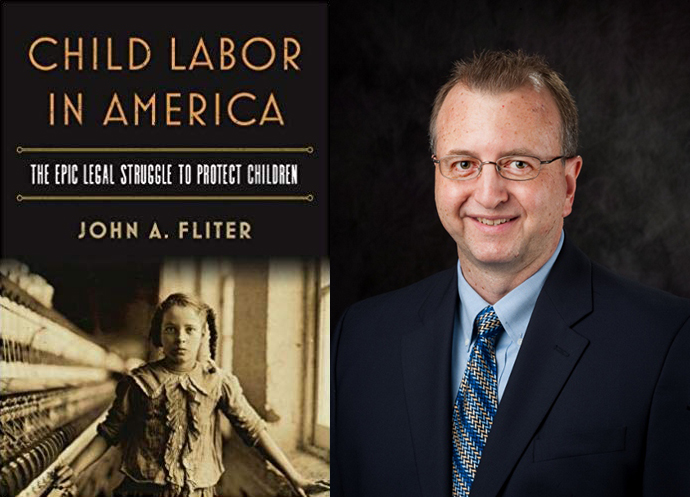 In Child Labor, John A. Fliter comprehensively and vividly chronicles the complex political and constitutional issues involved in what the title so aptly describes as the “epic struggle” against child labor. This carefully researched book offers new insights into many subjects, including the enactment and judicial nullification of the first two federal child labor statutes, the subsequent failure of efforts to add a child labor amendment to the federal Constitution, and the ultimate enactment during the New Deal of a statute that withstood the U.S. Supreme Court’s scrutiny. The book concludes with a survey of recent efforts to roll back these hard-fought reforms. – WGR
In Child Labor, John A. Fliter comprehensively and vividly chronicles the complex political and constitutional issues involved in what the title so aptly describes as the “epic struggle” against child labor. This carefully researched book offers new insights into many subjects, including the enactment and judicial nullification of the first two federal child labor statutes, the subsequent failure of efforts to add a child labor amendment to the federal Constitution, and the ultimate enactment during the New Deal of a statute that withstood the U.S. Supreme Court’s scrutiny. The book concludes with a survey of recent efforts to roll back these hard-fought reforms. – WGR
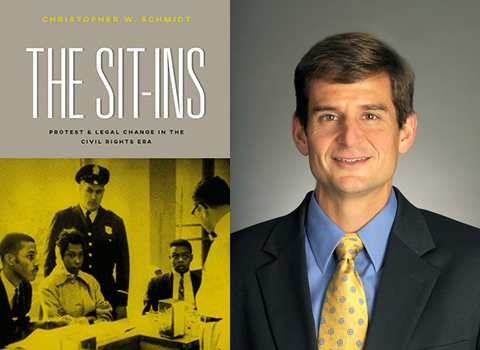 In The Sit-Ins, Christopher W. Schmidt carefully analyzes the early 1960s lunch counter sit-ins, in Greensboro, North Carolina and then sweeping across the American South, from the perspectives of the protesting students, their lawyers, sympathizers, opponents, and the Congress that was then considering civil rights legislation that culminated in the Civil Rights Act of 1964. The book describes the legal difficulty of using the 14th Amendment to protect protestors because the private owners of public accommodations are not the “state actors” that the 14th Amendment was designed to reach. As a result, the monumental 1964 Act was placed under the Congress’s commerce clause powers and not the 14th Amendment. Schmidt pays particular attention to the squabbles within the Supreme Court over the scope of the 14th Amendment in the struggle for equal accommodations, and writes clearly about the legal issues involved. – DJL, Sr.
In The Sit-Ins, Christopher W. Schmidt carefully analyzes the early 1960s lunch counter sit-ins, in Greensboro, North Carolina and then sweeping across the American South, from the perspectives of the protesting students, their lawyers, sympathizers, opponents, and the Congress that was then considering civil rights legislation that culminated in the Civil Rights Act of 1964. The book describes the legal difficulty of using the 14th Amendment to protect protestors because the private owners of public accommodations are not the “state actors” that the 14th Amendment was designed to reach. As a result, the monumental 1964 Act was placed under the Congress’s commerce clause powers and not the 14th Amendment. Schmidt pays particular attention to the squabbles within the Supreme Court over the scope of the 14th Amendment in the struggle for equal accommodations, and writes clearly about the legal issues involved. – DJL, Sr.
– – – – –
 The winner of the 2018 David J. Langum, Sr. Prize in American Historical Fiction is Louisa Hall’s Trinity
The winner of the 2018 David J. Langum, Sr. Prize in American Historical Fiction is Louisa Hall’s Trinity
The novel explores Robert Oppenheimer, father of the atomic bomb, through his interactions with seven imagined characters from 1943 to 1966. Speaking in “testimonials,” the characters concentrate more on their own lives despite the major world events unfolding around them. Throughout, Oppenheimer appears familiar yet enigmatic. Excellent historical fiction has the power to reveal emotional truths that history cannot, and Trinity does just that through its ingenious form and compelling prose. – VL.
– – – – –
The Finalist for the 2018 David J. Langum, Sr. Prize in American Historical Fiction is Nick Dybek for his The Verdun Affair (Scribner)
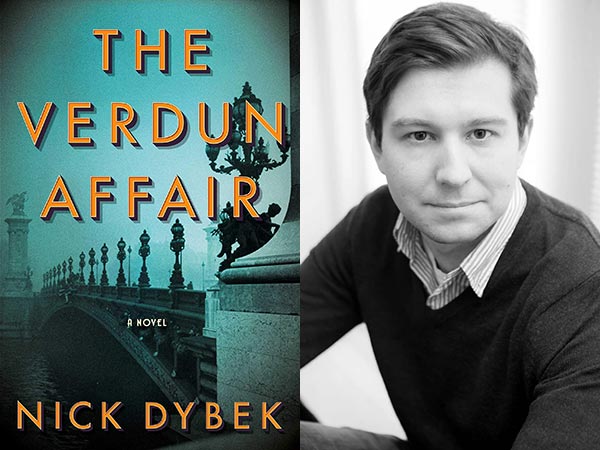 Set in Verdun, France and Bologna, Italy in the aftermath of World War I (with a small portion in 1950s Hollywood, California), the chief protagonists are American. A young man works gathering up bones from the former Verdun battlefield for an ossuary when a young woman arrives in search of information about her husband who was reported missing in action. She was one of many American women who roamed Europe searching for missing husbands in the years following the armistice. The two strike up a romance, and then travel to Bologna where a doctor is treating a mysterious shell-shocked soldier who has lost all memory. Circumstantial evidence suggests he might be the husband. A third major character enters the scene, an Austrian journalist who has his own interest in this mystery man.
Set in Verdun, France and Bologna, Italy in the aftermath of World War I (with a small portion in 1950s Hollywood, California), the chief protagonists are American. A young man works gathering up bones from the former Verdun battlefield for an ossuary when a young woman arrives in search of information about her husband who was reported missing in action. She was one of many American women who roamed Europe searching for missing husbands in the years following the armistice. The two strike up a romance, and then travel to Bologna where a doctor is treating a mysterious shell-shocked soldier who has lost all memory. Circumstantial evidence suggests he might be the husband. A third major character enters the scene, an Austrian journalist who has his own interest in this mystery man.
The book is well-written and a page turner. It has numerous elements of interest: a tender affair, the entry of a competing male, a dreadful description of Verdun following the battle, the mysterious amnesiac and the efforts to restore his memory or otherwise identify him, the chaos in Bologna incident to the early years of the Mussolini movement, and the pervasive effects of a significant mistruth spoken by one of the principal characters. – DJL, Sr.
For the year 2017
The Winner of the 2017 David J. Langum, Sr. Prize in American Historical Fiction Is Laurel Davis Huber for Her The Velveteen Daughter (She Writes Press)
 Laurel Davis Huber’s Velveteen Daughter composes the documented but unassembled lives of author and artist, as well as mother and daughter Margery Williams Bianco and Pamela Bianco. While Margery Williams Bianco’s Velveteen Rabbit is still cherished by contemporary generations, her daughter Pamela Bianco was arguably more famous in her lifetime. Pamela was a child prodigy discovered in Italy in 1919. After a successful exhibition in London, Bianco gains a patron in Gloria Vanderbilt Whitney who sets the young artist up with a studio and an apartment in New York.
Laurel Davis Huber’s Velveteen Daughter composes the documented but unassembled lives of author and artist, as well as mother and daughter Margery Williams Bianco and Pamela Bianco. While Margery Williams Bianco’s Velveteen Rabbit is still cherished by contemporary generations, her daughter Pamela Bianco was arguably more famous in her lifetime. Pamela was a child prodigy discovered in Italy in 1919. After a successful exhibition in London, Bianco gains a patron in Gloria Vanderbilt Whitney who sets the young artist up with a studio and an apartment in New York.
The novel takes place in the 1940s through 1970s. In the 1940s, we hear the alternating voices of Margery and Pamela during an acute episode of Pamela’s mental illness. Both often allude to the fateful moment when Pamela’s father the bookseller Francesco Bianco enters her into a contest in Turin which serves as the catapult to her international fame. While she is always anxious of her daughter’s celebrity and commissions, Margery is reticent to discourage her husband’s efforts. In the 1970s, Pamela is elderly and largely forgotten by the art world. She has survived one unhappy marriage and one happy one.
The lives of the Bianco family intersect with many artists and authors, some now remembered and some now forgotten. Eugene O’Neill marries and divorces Pamela’s cousin. Pablo Picasso comes to dinner and exchanges drawings with a four-year old Pamela. The Welsh poet Richard (Diccon) Hughes is Pamela’s unrequited and devastating love. While the novel includes vivid scenes of bohemian life both in Wales and Italy, as well as Greenwich Village and Harlem, The Velveteen Daughter is ultimately a novel about the intimate dynamics of familial and romantic love with its myriad expectations and disappointments.
Huber draws on letters and newspapers, and in the notes appended after the novel, carefully delineates fact from fiction. Yet the sources most central to the novel are those created by Pamela and Margery: Pamela’s paintings and Margery’s Velveteen Rabbit. Pamela’s art emerges in exuberant visions. It is spontaneous and joyful, a natural extension of herself. Yet this method does not always please the market, and her father urges her to paint in particular ways that are fashionable at the time to the detriment of her physical and mental health. Yet the velveteen rabbit of Margery’s story becomes real in his loss. So, too, does the Velveteen Daughter become in hers. The narrative ends with plans for a painting “just as I feel. Just as I wish”. — VL
– – – – –
The Finalists for the 2017 David J. Langum, Sr. Prize in American Historical Fiction Are Wiley Cash for His The Last Ballad (Morrow) and Janet Benton for Her Lilli de Jong (Doubleday)
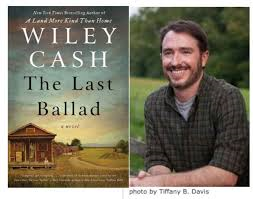 The Last Ballad is a fictionalized biography of Ella May Wiggins, an actual woman, with five children and a husband prone to stray. In the late 1920s she was employed in a carding room of a textile mill located in Bessemer City, North Carolina at the pitiful wage of $9 per seventy-two-hour workweek. Ella and her four children lived in conditions of acute poverty, powerfully shown to us by detailed descriptive writing that is neither angry nor sentimental. Labor unions had just begun to enter the struggle for better conditions in the textile industry. She was attracted to the union movement and began to use her vocal talents by singing at union rallies. Some of Ella May’s songs would later be performed by Woody Guthrie and recorded by Pete Seeger. Eventually, she quit her factory job to work full time for the National Textile Workers Union, a labor organization of the American Communist Party. After a particularly violent labor rally in June 1929, some goons, undoubtedly hired by the owners of the mill, murdered Ella May Wiggins. A precis of this story cannot do justice to the haunting emotions this novel’s lyrical writing evokes in a reader. Highly recommended. – DJL, Sr.
The Last Ballad is a fictionalized biography of Ella May Wiggins, an actual woman, with five children and a husband prone to stray. In the late 1920s she was employed in a carding room of a textile mill located in Bessemer City, North Carolina at the pitiful wage of $9 per seventy-two-hour workweek. Ella and her four children lived in conditions of acute poverty, powerfully shown to us by detailed descriptive writing that is neither angry nor sentimental. Labor unions had just begun to enter the struggle for better conditions in the textile industry. She was attracted to the union movement and began to use her vocal talents by singing at union rallies. Some of Ella May’s songs would later be performed by Woody Guthrie and recorded by Pete Seeger. Eventually, she quit her factory job to work full time for the National Textile Workers Union, a labor organization of the American Communist Party. After a particularly violent labor rally in June 1929, some goons, undoubtedly hired by the owners of the mill, murdered Ella May Wiggins. A precis of this story cannot do justice to the haunting emotions this novel’s lyrical writing evokes in a reader. Highly recommended. – DJL, Sr.
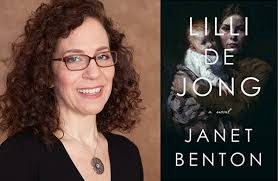 Lilli de Jong tells a sad story that ends well. Lilli becomes pregnant by her well-meaning boyfriend Johan, who intends to marry her. He leaves Philadelphia, where the novel is set, to secure employment in Pittsburgh, unaware that he will soon be a father. Meanwhile Lilli is thrown out of her family home when her pregnancy becomes apparent, and the two lovers are unable to communicate because her father confiscates all incoming mail from the boyfriend, which letters contain his new address. An agent sent by the reimbursement-seeking charity hospital to locate Johan, falsely reports to him that Lilli has married another. Eventually Johan and Lilli reunite under circumstances that try the imagination, but, suspending that, all is well again.
Lilli de Jong tells a sad story that ends well. Lilli becomes pregnant by her well-meaning boyfriend Johan, who intends to marry her. He leaves Philadelphia, where the novel is set, to secure employment in Pittsburgh, unaware that he will soon be a father. Meanwhile Lilli is thrown out of her family home when her pregnancy becomes apparent, and the two lovers are unable to communicate because her father confiscates all incoming mail from the boyfriend, which letters contain his new address. An agent sent by the reimbursement-seeking charity hospital to locate Johan, falsely reports to him that Lilli has married another. Eventually Johan and Lilli reunite under circumstances that try the imagination, but, suspending that, all is well again.
While the couple are separated Lilly has her baby daughter in a charity hospital, refuses the expected gift of the child for adoption. Lilli’s severest trials begin when she is forced to leave the charity. The difficulties facing a single mother in the urban America of 1883 are vividly portrayed. Insult, sexual harassment, theft, lack of employment opportunity all face this determined mother as she is forced to sleep with her daughter in filthy alleys and train stations. It is a stinging indictment of self-righteous bourgeois America that makes 1883 seem worse than but still close to our own day. – DJL, Sr.
– – – – –
I would like to informally discuss four books in lieu of the formal Director’s mentions of previous years. The Twelve-Mile Straight, by Eleanor Henderson (Ecco) is a Southern saga set against the background of Prohibition and the Depression. It is a grim work whose characters experience few transient joys and no enduring happiness. The novel has a remarkable structure, a Roshomon-like style where new interpretations open up as the novel progresses and our understanding of past events become subject to change or major alteration. It reminded me a bit of Lawrence Durrell’s The Alexandria Quartet in that regard, although Twelve-Mile Straight lacks the pleasures and passions of Durrell’s work.
It is not an absolutely novel thing for characters with disabilities to appear in historical fiction. The winner of our own 2014 prize, What is Visible by Kimberly Elkins, had a protagonist, the actual Laura Bridgman, who had been stripped of sight, hearing, taste, and smell by childhood scarlet fever. Even so, disabilities seldom appear in historical fiction, and it is notable that three novels of the past season feature them.
A Piece of the World by Christina Baker Kline (Morrow) is an excellent fictional biography of Christina Olson that describes her relationship with her family and their familial relationship with the famed artist Andrew Wyeth. Christina suffered from a progressive muscular disease that rendered her unable to walk, but was made famous in a sense by Wyeth’s use of her as a model for the famous painting “Christina’s World.” In Manhattan Beach by Jennifer Egan (Scribner), a significant character suffers from major muscle malfunctions, is quadriplegic, and can vocalize only poorly. Although she is only a secondary character, we do read of her impact on her family and on her sister, who is the protagonist. The debility is not named but is undoubtedly cerebral palsy. All She Left Behind by Jane Kirkpatrick (Revell), features a protagonist with a reading disability that she successfully overcame over the course of her life. Not named, it surely is dyslexia.
– – – – –
The Winner of the 2017 David J. Langum Sr. Prize in American Legal History Is The Long Reach of the Sixties: LBJ, Nixon, and the Making of the Contemporary Supreme Court, by Laura Kalman (Oxford)
This exuberant book explains how political controversies during the tumultuous Johnson and Nixon presidencies influenced the nomination and confirmation of U.S. Supreme Court justices and permanently transformed Supreme Court appointments process by intertwining it with the political agendas of presidents, Congress, and special interest groups.
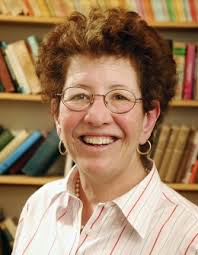 Professor Kalman’s meticulous research introduces newly mined information, fresh insights, and a dazzling array of delicious anecdotes into the controversies that swirled around the Supreme Court appointments of Johnson and Nixon, a subject that already has received substantial attention from historians. She deftly weaves political ideology, party politics, personalities, race, gender, and judicial issues into an exciting account of the forces that influenced the “liberal” appointments of Johnson during the waning years of the Warren Court and the “conservative” appointments of Nixon that attempted, but largely failed, to unravel the decisions of the Warren Court.
Professor Kalman’s meticulous research introduces newly mined information, fresh insights, and a dazzling array of delicious anecdotes into the controversies that swirled around the Supreme Court appointments of Johnson and Nixon, a subject that already has received substantial attention from historians. She deftly weaves political ideology, party politics, personalities, race, gender, and judicial issues into an exciting account of the forces that influenced the “liberal” appointments of Johnson during the waning years of the Warren Court and the “conservative” appointments of Nixon that attempted, but largely failed, to unravel the decisions of the Warren Court.
Although political considerations always have influenced Supreme Court appointments, Professor Kalman explains that presidents beginning with Johnson have been particularly assiduous in attempting to perpetuate their political legacies by nominating men and women whose political views will shape public policy through judicial decisions for decades to come. The rising political stakes of appointments has generated much greater scrutiny of nominees, increased the proportion of controversial nominations, and exacerbated partisanship in the appointments process. – WGR
For the year 2016
The Winner of the 2016 David J. Langum, Sr. Prize in American Historical Fiction Is Michele Moore for Her The Cigar Factory (Univ. of South Carolina Press).
This marvelous debut traces the lives of two working class families in Charleston during the years 1917-1946. The families are similar in many ways: devout and practicing Roman Catholics, headed by matriarchs who work in the local cigar factory, both struggling mightily for survival in severely limited circumstances. Yet they are dissimilar in ways crucial for Charleston in these years: one family is black and the other white, they attend separate churches, the matriarchs work in the cigar factory in segregated tasks and floors, use different restrooms, and receive different wages. Union organization and a strike begin a growing awareness by these two women of each other’s existence and the similarities of their and their families’ lives.
The author describes the difficult lives of these two families, both joys and sorrows, with great sensitivity and beauty. Dialect in novels is tricky, but Moore employs the Gullah dialect selectively and in brief snippets, and in so doing does not detract from the ease of reading the novel but rather adds to its verisimilitude. – DJL, Sr.
The Finalist for the 2016 David J. Langum, Sr. Prize in American Historical Fiction Is Chad Dundas for His Champion of the World (Putnam).
This debut novel portrays the world of American wrestling in the 1920s, when wrestling was more science than show. In lively and economic prose, Chad Dundas narrates the briefly lived comeback of former wrestling champion-turned carnival performer Pepper Van Dean and his card-shark wife who negotiate bootleggers, ruthless carnival owners, and the rise of professional wrestling. At the centre of the novel is a fictional match between the reigning champion and an underdog contender. Dundas’s training as a sports journalist shines through in the suspense of his scenes, in and out of the ring. Furthermore, the characters and the historical setting are vividly realized. – VL
The Winner of the 2016 David J. Langum, Sr. Prize in American Legal History/Biography Is Risa Goluboff for Vagrant Nation: Police Power, Constitutional Change, and the Making of the 1960s (Oxford University Press).
The extremely vague vagrancy laws allowed police to arrest somebody for such things as aimless wandering, seeming out of place in a setting, or being without money or employment to provide their support. Police loved these laws since it gave them almost unlimited discretion to lock persons up for such short sentences, 15-30 days usually, that they were almost never appealed. This, the police thought, prevented crimes that these unseemly persons might otherwise have committed. In fact, this wide discretion fostered grave abuse of law enforcement’s powers.
Before 1850 the vagrancy laws had been used sporadically, usually against undesirables, “tramps,” and those who refused to work during periods of labor shortage. During the 1950s and 1960s, the primary period reviewed by this book, the use of vagrancy laws was expanded and used to arrest homosexuals, civil rights activists, interracial couples, beatniks, hippies, and opponents to the Vietnam War.
Judicial pondering about the constitutionality of these laws in the 1960s ultimately led to the Papachristou v. Jacksonville decision in 1972. In that case the United States Supreme Court held that vagrancy laws as traditionally understood were unconstitutional for their vagueness and lack of any specific conduct declared wrongful. This excellent book is well-written and clearly accessible to the general educated reader. In addition the author has provided an abundance of historical and cultural context for the 1960s, so the reader is able to understand the operation of the vagrancy laws and their destruction as an integral part of the times. – DJL, Sr.
Two books won Finalist status for the 2016 David J. Langum, Sr. Prize in American Legal history: Ballot Battles: The History of Disputed Elections in the United States, by Edward B. Foley (Oxford University Press) and The Great Yazoo Lands Sale: The Case of Fletcher v. Peck, by Charles F. Hobson (University Press of Kansas).
In Ballot Battles, Foley analyzes the details of American elections, state and federal, in which the vote was contested, beginning with the 1781 dispute over the votes cast in an election for a seat on the Supreme Executive Council of Pennsylvania and ending with a 2008 disputed senatorial contest in Minnesota. Appropriately, he spends more time on the major contests, Hayes v. Tilden in 1876 and Bush v. Gore in 2000, but not to the neglect of lesser disputes.
The book focuses on irregularities with vote casting or counting, and therefore only briefly discusses the few election disputes that arose out of the structure of the electoral process, as in the elections of 1800 (tied electoral college vote caused by original structure of Electoral College before 12th amendment) and 1824 (no candidate received a majority of the electors, and election went to the House of Representatives). However, there are an abundance of very close elections that generated disputes over the validity of votes cast or their counting.
Foley attributes the disputes surrounding extremely close elections to a flaw in the original design of our constitutional order: the failure of the founders to provide guidance over the disposition of these disputes. He includes a brief discussion of proposed reforms. – DJL, Sr.
In The Great Yazoo Lands Sale, Professor Hobson vividly portrays the fascinating cauldron of legal, social, economic, political, and ethnic forces and colorful personalities that generated the Supreme Court’s decision in Fletcher v. Peck, which nullified the Georgia legislature’s repudiation of scandal-ridden sales of Indian lands to speculators. Hobson demonstrates the importance of the case in protecting vested property interests and establishing the Court’s hugely important role in reviewing the constitutionality of state legislation. – WGR
For the year 2015
David J. Langum, Sr. Prize for American Historical Fiction, Winner for 2015:
Good Night, Mr. Wodehouse by Faith Sullivan (Milkweed)
Good Night, Mr. Wodehouse is an exquisite gem. Nell Stillman, the protagonist, is an Everywoman. She lived almost her entire adult life in an apartment above a meat market in the small town of Harvester, Minnesota. Widowed at age 24 with an infant, Nell became the third grade teacher of the town’s school for 37 years. Almost nothing in the large scale of life occurred to Nell, yet many chaotic events in everyday life challenged her. Nell’s son returned shell-shocked from World War I; a young woman she nurtured became pregnant and left the small town in disgrace; some in the town blamed Nell for her charge’s disgrace; and Nell herself found love late in life with a fine man who died just before their scheduled marriage.
Aside from her own grit and independence, Nell had three other means of coping with life. The first was her small number of excellent friends. The second was the love she shared with a man over many years, yet blasted away by her lover’s untimely death. The third, and most important, was her love of reading. She read many novelists but fell in love with the novels of the British writer P.G. Wodehouse. She found time every evening to read, and, in a major theme of this book, Nell had the strength to carry on through the transformative power of reading.
The time of Nell’s adult life, c. 1900-1961, saw many historical changes of significant character, for example, numerous improvements in appliances and other implements of women’s work, W.W.I, women’s suffrage, electrification, prohibition, W.W.II, and so on. The book does not neglect these historical events but presents then from the satisfying perspective of what they meant to this little town, and what they meant to Nell Stillman. Highly recommend. – DJL, Sr.
David J. Langum, Sr. Prize for American Historical Fiction, Honorary Mention for 2015:
The Race for Paris by Meg Waite Clayton (Harper)
Inspired by true events and historical figures, the author tells the overlooked story of World War II female war correspondents and their quests to be the first to report the Allied liberation of Paris. This powerful story sweeps the reader into the front lines of battle where conditions for the correspondents are nearly as stark and dangerous as they are for the troops. Well researched and rich with vivid descriptions of wartime France, Clayton skillfully keeps the focus on the characters’ ambitions and personal dilemmas. Yet, the messiness and horror of war never leave the page. Layered with complicated relationships and motives, this gripping story about the correspondents’ quest to record events while dealing with their own quandaries fully engages the reader.
What especially sets The Race for Paris apart is its fresh examination of female correspondents in the front lines. Many novelists have written about World War II, but Meg Waite Clayton brings a new perspective not only to the war but to the risks endured by journalists and photographers. – AW
David J. Langum, Sr. Prize for American Legal History/Biography, Winner for 2015:
Who Freed the Slaves? The Fight over the Thirteenth Amendment, by Leonard L. Richards (University of Chicago Press), wins the David J. Langum, Sr. Prize in American Legal History for 2015. Richards vividly describes the messy process of the Congressional adoption of the Thirteenth Amendment before its submission to the states for ratification. Many today think that this amendment was simply an inevitable culmination of the Emancipation Proclamation, but that thought is incorrect. Even in the final stage of the Civil War, many opposed an outright ban on slavery. Richards explains this opposition and brings forward forgotten figures, such as Congressman James Ashley of Ohio, who were far more influential in securing the passage of the Amendment than Lincoln, who actually dragged his feet until the last moment before passage. Clearly and engagingly written, Richards has also based his work on sound scholarship exhibited in extensive endnotes. – DJL, Sr.
David J. Langum, Sr. Prize for American Legal History/Biography, Honorary Mention for 2015:
The 2015 Honorable Mention for American Legal History/Biography goes to Nancy Woloch’s A Class by Herself: Protective Laws for Women Workers, 1890s-1990s (Princeton University Press, 2015). Professor Woloch meticulously examines the complex political, constitutional, and social forces that contributed to the rise and fall of Progressive Era gender-specific legislation to protect the health and safety of women through minimum wages, maximum hours, and regulation of workplace conditions. The book traces the intense controversy over such laws among advocates of women’s rights, who increasingly believed that they hindered rather than promoted the interests of women by reinforcing gender distinctions and impeding equal rights. The book also explains how protective laws for women helped pave the way for similar measures for all workers during the Progressive Era and the New Deal. – WGR
For the year 2014
David J. Langum, Sr. Prize for American Historical Fiction, Winner for 2014:
What is Visible by Kimberly Elkins (Twelve)
This novel lyrically revives a significant and intriguing figure in the history of disability. Laura Bridgman (d. 1889) was a celebrity in her lifetime. Stripped of sight, hearing, taste and smell by scarlet fever in her childhood, Bridgman served as a poster child for the Perkins School for the Blind and various intellectual causes such as phrenology and anti-Calvinism.
Laura’s desperate need to command attention and to please others conflicts with her desire for a private life distinct from any larger cause. Through meticulous archival and imaginative labor, Elkins provides Bridgman with an inner life that offers a daring and convincing account of a woman who observes and communicates only through touch. As the author articulates in the appendix, the novel concerns “what might have happened as well” rather than “what might have happened instead.” Following this method, Elkins attends to Bridgman’s parameters for pleasure, longing, deprivation and defiance with a narrative voice that evokes sympathy without sentimentality.
Most of the novel gathers snugly around Bridgman’s life and perceptions, interspersed with the perspectives of those around her. In addition to the host of passing contemporary notorieties, such as Charles Dickens, who visit and comment upon her, Bridgman’s life intersects with prominent figures in more sustained ways. These include her doctor Samuel Gridley Howe, the poet Julia Ward Howe, and even the abolitionist John Brown.
What sets this novel apart is the author’s ability to imagine Laura Bridgman’s world and to give her a powerful narrative voice. With skill and compassion, Elkins portrays Bridgman as a complicated character whose strengths and flaws grow more complex as the story progresses. Historical details enrich the story, and the author deftly exposes the care and treatment of the disabled during the 1800s. This is American historical fiction at its best. – VL
David J. Langum, Sr. Prize for American Historical Fiction, Honorable Mention for 2014:
Rush of Shadows by Catherine Bell (Washington Writers’ Publishing House)
Small farmers in the coastal hills of Northern California’s Sacramento Valley and the indigenous Digger Indians they encountered in the 1850s are the moving forces in this sparsely but beautifully written novel. While there are fine passages describing the beauties of the land and the methods adopted by these pioneers for shelter, food, and formation of communities, the major theme is the relationship of these farmers with the local Indians.
The Indians of Northern California were wholly unlike their heartier cousins of the plains or the deserts. Americans referred to them as “diggers” because the beneficent California climate permitted them to thrive by gathering up roots and seeds coupled with minimal hunting. Their primitive technology rendered them absolutely defenseless against the invading hoard of Americans who, wanting their lands for conventional farming, raped and murdered the Diggers, stole their lands, and herded the survivors onto miserable reservations.
The book’s chapters are told from the perspectives of different characters, although dominated by Mellie, wife of an American settler, and Bahé, granddaughter of the Indian band’s shaman. Tension mounts throughout the book, and the ultimate outcome comes dramatically but without sentiment. The characters are drawn well, two of them beginning with strong anti-Indian feelings that soften over time. In the hands of a lesser writer, Mellie could have become a stock character of a strong woman who saves the tribe from removal. Here, more sensitively and more realistically, her influence is smaller and more personal: providing medicine for one Indian child, a job for one woman, and a warning about an impending capture. Bahé is even more delicately drawn as a strong woman who realizes the futility of fighting the white man, but who draws on her inner strength as the new spiritual leader of her band to accommodate and preserve as much of the old ways as is possible.
This is truly fresh material. The Trail of Tears is well-known, but Indian removals in California are relatively obscure. The characters are well-drawn and the descriptions vivid. A beautiful book. – DJL, Sr.
David J. Langum, Sr. Prize for American Historical Fiction, Director’s Mention for 2014:
The Moor’s Account by Laila Lalami (Pantheon Books)
While The Moor’s Account does not fully meet the requirements for the prize, the Director commends this excellent novel.
“It was the year 934 of the Hegira, the thirtieth year of my life, the fifth year of my bondage – and I was at the edge of the known world.” So begins this extraordinary, pitch-perfect work of historical fiction about the Narváez expedition in Florida. The narrator is Mustafa al-Zamori, a slave from Azemmur whom the Castilian explorers call Estebanico. Mustafa, one of four expedition survivors and who is haunted by his own demons, tells an unvarnished account of the exploration of Florida and the Southwest. The 600-man expedition (1528-1536) is a disaster from the moment the ships arrive on the Gulf Coast. The leaders engage in power struggles, the expedition gets lost, and within a few years all but four men are dead from accidents, starvation, and disease. These survivors cross all the way along the southern border of the present United States, from Florida to Mexico. The expedition’s encounters with native peoples are equally harrowing. Mustafa’s account painfully foreshadows the future of Native Americans.
The novel is rich with moral quandaries about what people will do to survive. The author’s attention to historical and ethnological detail is remarkable as is the scope of the story which covers Africa, Spain, and the New World, including Mexico. Yet the details never slow the pace or the excitement of the story.
What especially sets The Moor’s Account apart is the author’s ability to bring alive an extraordinary piece of history told by an overlooked narrator. – AW
David J. Langum, Sr. Prize for American Legal History/Biography, Winner for 2014:
The winner of the David J. Langum, Sr. Prize in American Legal History/Biography for 2014 is Baseball on Trial: The Origin of Baseball’s Antitrust Exemption, by Nathaniel Grow (University of Illinois Press). This book describes in rich detail the rivalry and litigation between the three American baseball leagues in the early twentieth century: the upstart Federal League and the better-established American League and National League. Through a complex set of personalities, deals, and litigation, all of which Grow well chronicles, the issue of whether the leagues were subject to the federal anti-trust laws was ultimately presented to the United States Supreme Court in the landmark case of Federal Baseball Club of Baltimore v. National League of Professional Baseball Clubs, decided in 1922. It certainly seemed as though the leagues were anti-competitive. They controlled many phases of baseball including hiring, salaries, movement of players from one team to another, even the sale of teams. Yet Justice Oliver Wendell Holmes writing for the Court concluded that baseball was not even interstate commerce, notwithstanding the regular crossing across state lines for teams to play one another. This story constitutes the major portion of Grow’s work.
A rushed epilogue traces the later judicial treatment of this exemption, and the impact of collective bargaining, but lacks discussion of Congress’s belated entry into the arena through its curiously limited Curt Flood Act of 1998.
Of particular interest is the skill with which Grow delineates the trial strategies of counsel, discussing several weaknesses in the way the plaintiff’s case was presented. He is kind to Justice Holmes in reminding the reader that the huge apparatus of interstate television, radio, and advertising for baseball simply did not exist in 1922, and it was possible with a straight face to claim that professional baseball was not engaged in interstate commerce. – DJL, Sr.
David J. Langum, Sr. Prize for American Legal History/Biography, Honorary Mention for 2014:
The 2014 honorable mention for American Legal History/Biography goes to Her Honor: Rosalie Wahl and the Minnesota Women’s Movement, by Lori Sturdevant (Minnesota Historical Society Press). This engaging biography of Rosalie Wahl (1924-2013), who in 1977 became the first woman to serve as a justice of the Minnesota Supreme Court, provides a comprehensive account of the life and accomplishments of an important jurist. It also offers significant insights into the struggles of women to erode gender barriers in the legal profession and in politics in Minnesota and throughout the nation during a period of rapid social change. – WGR
For the year 2013
David J. Langum, Sr. Prize for American Historical Fiction for 2013:
Crossing Purgatory, by Gary Schanbacher (Pegasus). The title carries a double meaning, referring to the crossing of a river in western Kansas where the protagonist settled and made his home, and also the crossing of his own, personal purgatory. A spiritual dimension enlightens this book, not pushed upon the reader and so subtle that a uninterested reader could ignore it but then miss much of the book’s value. When we first meet Thompson Grey he is matching westward from his family farm in Indiana, filled with guilt and remorse. He joins a wagon train traveling westward on the Santa Fe Trail, then settles in a ranch operated by the captain of the wagon train in western Kansas. Throughout the trip and in his stay at the ranch Grey acts humanely, responsibly, and is esteemed by all. Yet his guilt remains with him as gradually the reader understands its basis. His root sins, he understands, are cupidity and the coveting of land, and these he believes had caused the death of his wife and children back in Indiana. In the west he is eventually tempted again, but he finds the means to resist, and while his method might seem extreme to many, it is true to the man and his history.
Irrespective of the protagonist’s inner struggles, the story itself is well-told and exciting. Once again, we have an excellent novel that paints the west with more depth than is usual, that portrays the evil and the hardship as well as the rewards. – DJL Sr.
David J. Langum, Sr. Prize for American Historical Fiction, Honorable Mentions for 2013
Seven Locks, by Christine Wade (Atria). Set in the rural Hudson River Valley at the time of the American Revolution, the narrator has far more than her share of difficulties. Her husband, lazy and often absent, finally disappears. Her daughter and son are adolescents and difficult to deal with. Then come the pillages and desolation caused by both sides of the Revolution. She flees and leaves the country. Years later her husband, with a fantastic excuse for his disappearance, returns to the settlement, where the daughter and her husband now live. There is much here about the interior life of the characters, but what makes this book most singular is that it is set among farmers of Dutch descendent. It provides insight into the Dutch colonists and their successors, a group here well-described and about whom little has been written. – DJL Sr.
Swimming in the Moon, by Pamela Schoenewaldt. (Morrow). Lucia and her mother Teresa emigrate from Italy and arrive in Cleveland in 1904. They have the usual immigrant struggles, working long hours for poor pay. Additionally, the mother’s mental health becomes steadily worse, and Lucia faces a conflict between her own ambitions and her duty to her mother. The news of New York’s Triangle Factory fire galvanizes Lucia into participation in the local labor movement. The author has richly drawn her characters and clearly portrayed the emotional tolls cast on the new immigrants. What really sets this novel apart, however, is its depth of social history, the detailed accounts of immigrant life. – DJL Sr.
Langum Prize for American Legal History/Biography for 2013
The winner for 2013 is Obscenity Rules: Roth v. United States and the Long Struggle over Sexual Expression, by Whitney Strub (University Press of Kansas). This long title is perfectly appropriate since the book covers far more than its principal case, although it does discuss Roth well and in detail. However, the book also analyzes American attitudes and law regarding obscenity from our colonial times to the present. In doing so its scope extends well beyond the time of Roth in 1957 to porno chic and the disparate feminist interpretations of pornography of the 1960s and 1970s and beyond to the present. A great virtue of Strub’s work is that he brings in a great variety of background factors, including changing social mores and even changes in technology, to inform our understanding of changes in legal norms regarding obscenity, a legal term, and pornography, a cultural construct. – DJL, Sr.
Honorary Mention Langum Prize for American Legal History/Biography for 2013
The 2013 honorable mention for American legal history goes to Father, Son, and Constitution: How Justice Tom Clark and Attorney General Ramsey Clark Shaped American Democracy (University Press of Kansas). The author, Alexander Wohl, has thoroughly and engagingly explained how Tom C. Clark and his son Ramsey Clark made enduring contributions to American constitutional law, especially in cases involving civil rights, free speech, personal privacy, and presidential power. Both were united in their dedication to the freedom of citizens from intrusive government, despite differences that reflected their personalities, interests, and the times in which they worked. Wohl shows how the elder Clark accomplished many of his goals through established institutions while his more iconoclastic son often initiated bold actions to challenge injustices. Wohl’s highly contextual work offers fascinating insights into the Supreme Court during Tom Clark’s tenure from 1949-1967 and the Johnson Administration during Ramsey Clark’s service as U.S. attorney general from 1967-1969. – WGR
For the year 2012
David J. Langum, Sr. Prize for American Historical Fiction for 2012:
The Cove, by Ron Rash (New York: Ecco, 2012). This powerful and atmospheric novel takes place in the North Carolina mountains during the final year of World War I. The story revolves around a sister and brother, Laurel and Hank, whose family home in an isolated cove is darkened by cliffs, ridges, and local superstitions. Both are wounded people. Hank lost part of an arm while serving in the army in France. Laurel has a birthmark on her shoulder and neck, and is feared and ostracized by the community. Their lives change when they take in a stranger who plays the flute but does not speak.
The Cove is American historical fiction at its best. The writing is lyrical and the novel is rich with symbolism, yet the prose does not overshadow the story. Rash’s use of regional language adds depth to the characters and never strays toward ridicule. Small details – a flour-cloth dress, a hearing machine with wires and a dial, wagon and automobile tracks on the same road – speak to time and place. With a light touch, Rash balances anti-German sentiment and America’s increasing impatience with the war. The sense of doom established in the prologue heightens with each ensuing scene until the novel ends with a satisfying conclusion.
There is much to commend about The Cove. For the purposes of this prize, its remarkable achievement is the insight into a little known historical event: the seizure of the German ocean liner, the Vaterland, and the placement of its crew in a North Carolina internment camp. A.W.
David J. Langum, Sr. Historical Fiction Honorable Mention for 2012:
Slant of Light: A Novel of Utopian Dreams and Civil War, by Steve Wiegenstein (Saint Louis: Blank Slate Press, 2012). This well-written debut novel describes the travails of a utopian colony in southern Missouri during the late 1850s. At a deeper level it is also a meditation on the decline of order – social order, sexual order, and political order – all clearly delineated but with no causal explanation other than “homo homini lupus.” Man is a wolf to man, and probably an ample reason.
James Turner is an itinerant lecturer, expounding on the merits of a proposed utopian community to be founded on the principles of democracy, balance, trust, openness, and harmony. A farmer in southern Missouri offers him land, and Turner and his small band of followers begin their agricultural settlement. Turner’s wife Charlotte at first is a somewhat quiet character, but over time and tribulations becomes more forceful. Soon a philosophical Adam Cabot, an abolitionist, joins their settlement. Much of the novel traces the community’s efforts, failures, and successes.
Social order, at least as defined by the founding principles, breaks down very quickly. Largely because of the recalcitrance of a small number of the colonists, Turner increasingly imposes his will in community meetings, employing deception, secrecy, and sometimes force. Sexual order is threatened by Charlotte’s valiant struggle to keep her deep attachment to Adam on a platonic basis. James succumbs fairly easily to the allurements of a young colonist, Marie, and is caught by his wife.
The collapse of political order arrives with the coming of the Civil War. Missouri is a border state with bitter feelings on both sides of secession and slavery, and also the need to fight for either. The membership of the colony itself is divided. Turner struggles to maintain the group’s neutrality, but ultimately more and more members leave the join the fighting, and the settlement is left in virtual suspension, with only Charlotte to hold on. Wiegenstein handles the coming of the Civil War adroitly, refusing to foreshadow events. The reader hears of incidents leading to the war only as the community becomes aware of them.
Congratulations are due to Wiegenstein for this lovely book on a neglected border state and also are due to the new small press that published it. D.J.L., Sr.
2012 Langum Prize in American Legal History/Biography:
The winner of the 2012 David J. Langum, Sr. Prize in American Legal History or Biography is Samuel Walker for his Presidents and Civil Liberties from Wilson to Obama: A Story of Poor Custodians (Cambridge: Cambridge University Press, 2012). This work is a tour de force that that discusses virtually every significant event, judicial decision, or government activity affecting civil liberties in America from 1913 (Wilson’s inauguration) to 2009 (Obama’s inauguration). Organized primarily by Presidential actions or reactions, the author analyzes each President by his civil rights record, and, finding them all to be lacking, concludes with the subtitle of the book, that on the whole they have been poor custodians of Americans’ civil liberties.
This is no dry discussion of changing legal doctrine. As appropriate, Walker is careful to bring to the discussion how changes in the economy, public opinion, social conditions, wartime fears, and protests have been inextricably involved with the expansion and contraction of civil rights. He brings a generally liberal and civil-libertarian outlook to his work, and is candid to disclose that he has had thirty years of involvement with the ACLU. Nonetheless, he is scrupulously fair. Where Presidents generally thought of as conservative did something favorable to civil liberties he describes it and renders praise. An example of this is President Harding’s pardon of Eugene Debs, a notable victim of Wilson’s World War I suppression of free speech. Likewise where Presidents generally thought of as liberal did something unfavorable to civil liberties, he describes that too and criticizes. An example of this is President Truman’s Loyalty Program and its use of guilt by association. He makes a clear case that disrespect for civil rights is nonpartisan.
General readers should not be discouraged by the footnotes being placed where they should be positioned for convenience of reference: at the foot of each page. Although many facts and much history are packed within this 510 page volume, Walker has written an extremely readable account. DJL, Sr.
2012 Honorary Mention Langum Prize in Legal History/Biography:
Honorable mention goes to R. Kent Newmyer for his The Treason Trial of Aaron Burr: Law, Politics, and the Character Wars of the New Nation (Cambridge: Cambridge University Press, 2012). This short well-written volume focuses, as implied by the title, on the trial of Aaron Burr for treason and high misdemeanor. Newmyer only briefly discusses background: the confusing facts of the alleged conspiracy to break off western portions of the nation, the motivations for Jefferson’s denunciation of Burr, or the puzzling aspects of the prosecution (especially why Burr was not charged with a much more easily proven violation of the Neutrality Act in addition to the difficult Treason and High Misdemeanor charges). Instead, Newmyer concentrates on the pretrial activities and trial itself. Although the trial did much to elucidate the American law of treason, it cannot be said to have resolved the factual issues that lay behind the conflict. What Burr was really up to may always remain shrouded in mystery, and in our confusion we can take some comfort with the fact that it was equally confusing to the contemporaries of the events. DJL, Sr.
For the year 2011
Langum Prize for American Historical Fiction for 2011:
Julie Otsuka, The Buddha in the Attic (New York: Knopf, 2011). This short, poetic book describes the experience of the Japanese “picture brides” who were brought over in the very early part of the 20th century to marry Japanese men working in the United States, mostly as farm laborers. The writing is beautiful, and, although the book is sparse, each word carries weight. The Buddha describes their passage over, their meetings with their new husbands, and their difficult relationships with Anglos. It follows them working on the farms and through the Depression, and takes them up to their rounding up for imprisonment in the American concentration camps of W.W. II. The Buddha has an unusual style. It describes a particular person or situation in two or three tight third person sentences, and just as often does the same in the first person plural (“we” or “one of us”). The reader at first feels disoriented, but quickly this babble of individual situations and persons blends together into a harmonious chorus.
American Historical Fiction Honorable Mention for 2011:
Geraldine Brooks, Caleb’s Crossing (New York: Viking, 2011). The mid-seventeenth century Massachusetts of Martha’s Vineyard and Cambridge provide the settings for this exquisitely and lushly written novel that explores the clash of cultures between the Puritans and the native Wampanoag inhabitants. Caleb, the son of a local Indian chief, wishes to learn the white man’s ways and is educated by a liberal Puritan minister on Martha’s Vineyard. Bethia Mayfield, the minister’s daughter, meets Caleb, and the story evolves from her viewpoint. Bethia and Caleb form a close and secretive relationship, always platonic, around their mutual affinity for books and knowledge, nature, and each other’s culture. Bethia is especially discontent with the meager educational opportunities available to her as a girl and cleverly contrives to use all the situations in which she finds herself to clandestinely acquire knowledge. There is a good amount of history in this work, but it is interwoven and well-blended with the literary character of the novel. That a Wampanoag Indian named Caleb graduated from Harvard College in 1665 is fact, but the balance of the book is beautifully written fiction, albeit well-grounded in historical research.
Director’s Mention for 2011:
This is an unusual Director’s Mention, since the praise is directed to publishers as well as authors. I noticed this year an unusual abundance of good historical novels published by small and regional presses. In the hope that this may be the beginning of a trend, I would like to mention four such novels published in 2011, alphabetically by author. John M. Archer, After the Rain: A Novel of War and Coming Home (Gettysburg, PA: Ten Roads Publishing, 2011) was excellent enough to be on our shortlist, and is more fully described there. It concerns a wounded and discharged Union line officer’s return to home, plagued by guilt over his comrades’ deaths and what we would today call “post-traumatic stress disorder.” The numerous photographs add much to the account, but must have added considerably to the production costs. James Hoggard, The Mayor’s Daughter (San Antonio, TX: Wing’s Press, 2011) is set in a small north Texas town during the 1920s oil boom. It is an account of conflict between a young woman and her parents over her choice of husband, and although this is a well-trod theme, the book is well-written and ends more violently than most of these conflicts. Hugh Nissenson, The Pilgrim: A Novel (Naperville, IL: Sourcebooks, 2011) tells the story of a Calvinist who comes to Massachusetts from England in 1622. Torn up by the strictures of Predestination, the protagonist is haunted by worries that he does not measure up and is not one of the Elect. The book offers a fascinating look into the interior world of the Massachusetts Calvinists. Sheila Ortiz-Taylor, Homestead (Midway, FL: Spinsters Ink, 2011) is set in Florida and Georgia and concerns a large lower middle-class family during the 1920s and 1930s. In times of great uncertainty, when the family is forced to make many changes and suffers much adversity, this book is a testament to the resiliency and staying power of women. Shirley Reva Vernick, The Blood Lie (El Paso, TX: Cinco Puntos Press, 2011) is a well-written young adult novel. It describes an actual incident in a small town of upstate New York in the late 1920s, when a young Jewish boy was accused of murdering a young girl, who had become lost but was quite alright, for the use in supposed religious ceremonies.
Langum Prize in American Legal History for 2011:
Two books won the Langum Prize for 2011.
Stuart Banner’s American Property: A History of How, Why, and What We Own (Harvard University Press, 2011) provides a fascinating account of the evolution of concepts of property in American law. Banner demonstrates that definitions of property that Americans today take for granted were not inevitable and resulted from complex economic, political, and social forces. Banner guides the reader through a wide array of types of property, including news, airwaves, phonographic sounds, trademarks, human body parts, publicity, and cyberspace. He also discusses the development of law regarding zoning, condominiums, and public takings of private property, along with the rise and fall of social spending programs as entitlements. Extraordinary in its depth of research and breadth of scope, Banner’s book is so engagingly written, particularly in its wealth of anecdotes, that a general reader might not fully appreciate its importance as a work of scholarship.—WGR
Inside the Castle: Law and the Family in 20th Century America (Princeton University Press, 2011), by Joanna L. Grossman and Lawrence M. Friedman, describes the recent transformation of American family law in its many facets: ceremonial marriage, common-law marriage, cohabitation, same-sex relationships, divorce, spousal and child support, child custody, elder law, adoption, and even parentage itself in our age of sperm donation, egg donation with gestational surrogacy, and posthumous conception. Grossman and Friedman present law as a dependent variable, family law changing in response to the massive change in social mores during the twentieth century. One dominant theme is the decline of the traditional family, where rights and duties were dependent on the status of the family members (husband, wife, or child), and the rise of much more complex and often short-lived relationships that emphasize the fulfillment of each person’s individualism. A second theme is the transfer of many traditionally familial responsibilities to the government. The authors present an abundance of information in a very readable style made even more accessible by the inclusion of numerous short interesting vignettes of real people and cases.—DJL, Sr.
For the year 2010
Langum Prize for American Historical Fiction for 2010:
Ann Weisgarber for The Personal History of Rachel DuPree (Viking). Several books have appeared recently depicting the role of blacks in the development of the American West, for example as park rangers or Buffalo Soldiers. Yet this well-written debut novel may be the first centering on a black family as homesteaders. Because it is set in the late period of homesteading, the first two decades of the twentieth century, the protagonist couple had slim pickings of available land, and they settled into the Badlands of South Dakota. That meant marginal land and severe droughts, with concomitant physical and emotional strain.
The conflict is between the conflicting aspirations of husband and wife. The wife wants her children to experience the social and physical comforts of civilization, as she had known at least partially while living in Chicago. The husband has the usual aspiration of male frontier protagonists: the acquisition of more and more land, but in his case with the added twist that he hoped this acquisition would result in greater respect for him and his family from his white neighbors. The climax comes when the husband leaves the ranch for the winter to work in the Black Hills gold mines in order to pay for still more land and cattle. The resolution is ambiguous and incomplete, which is usually unsettling yet not in this case. The author has given enough insights into the personalities involved that the reader can imagine alternative plausible conclusions.
The writing and imagery is beautiful, but the main strength of the book is the insight into the impact of pioneer life on the husband and wife. It is reminiscent of the writings of Ole Rolvaag in its insistence that the western frontier experience was not just a matter of “upward and onward,” but that it came at a high human cost. – DJL, Sr.
American Historical Fiction Honorable Mention for 2010:
Robin Oliveira for My Name is Mary Sutter (Viking). This is an impressive debut novel, but more than that it is a masterly work of historical fiction. A powerful and engaging story of a young woman’s quest to become a physician in nineteenth-century America, this novel (which won the James Jones First Novel Fellowship for a work in progress), illuminates the period just before and during the American Civil War through the confident, subtle use of historical detail and believable – that is, flawed and ambitious – characters. The research underpinning the narrative is vast yet unobtrusive, revealing the medical, economic, political, and other social realities of the era. My Name is Mary Sutter gives us an unusual perspective on a subject so similar to readers of American fiction and nonfiction. Here we see the catastrophe of the Civil War through the eyes of a young midwife from Albany, New York, as she struggles against the conventions of her time in the horrific hospital wards of the nation’s capital. Ms. Oliveira offers an original angle of vision that allows us to see the struggle of women and the violently disintegrating union with new eyes. It is a remarkable achievement. – RJB
Director’s Mention for 2010:
This is a category for a book or two that, while not qualifying for either the prize or honorable mention, nevertheless caught the Director’s eye and ought to be mentioned.
Kelli Carmean for Creekside: An Archeological Novel (University of Alabama Press). An interesting story of a multi-generational pioneer family farm in Eastern Kentucky is combined with a fictional account of a modern archeological dig at that same location. The two stories obviously have many points of contact. Although well-written and worthy of attention on its own merits, this book deserves mention primarily as one of the very few, perhaps the only, historical fictions informed by archeology. – DJL, Sr.
Jackson Taylor for The Blue Orchard (Simon & Schuster). From an Irish immigrant family, Verna Krone leaves school at eight and begins work as a maid to help support her family. She has a very difficult time in her young life, but teaches herself to read and ultimately becomes a nurse. After considerable inner conflict she becomes a nurse for a black doctor whose principal practice is abortion. The motivations of both doctor and nurse are interesting and more complex than either a cynical desire to make money or an altruistic wish to help unfortunate women out of unwanted pregnancies. The reader is treated to an immense amount of social history, c.1910-1960 centered in Harrisburg, Pennsylvania, in this well-written novel that is based on actual persons and events. – DJL, Sr.
Langum Prize in American Legal History for 2010:
The winner of the 2010 David J. Langum, Sr. Prize in American Legal History is Stephen C. Neff for Justice in Blue and Gray: A Legal History of the Civil War, published by the Harvard University Press. The American Civil War generated a complex tangle of legal and constitutional issues, which generally are overshadowed by the massive literature on the political, military, and economic aspects of the war. In Justice and Blue and Gray: A Legal History of the Civil War, Stephen C. Neff provides a fascinating account of how the President, Congress, and the courts grappled with an array of novel questions involving separation of powers, federal power, and international law.
Neff analyzes the legal status of the Confederacy; the power of the federal government to suppress the rebellion; the constitutionality of the widespread suppression of civil liberties; the legal aspects of the abolition of slavery; and problems arising from the confiscation and destruction of private property and the occupation of large parts of the Confederacy. Neff also explores the constitutional dimensions of the hugely expanded role of the federal government through legislation providing for military conscription, an income tax, and the issuance of paper money. Neff demonstrates how the American legal system provided an essential framework in which the nation could achieve its military and political goals, and he concludes that the legal system’s robust ability “to cope with so challenging a catastrophe says much for the maturity of the country at that time.”
An excellent resource for scholars, Neff’s book also is highly accessible to general readers, especially since it provides lucid explanations of legal concepts and terminology and is written in a vivid and engaging manner. — WGR
Legal History Honorable Mention for 2010:
Honorable Mention is made to Steven Lubet for Fugitive Justice: Runaways, Rescuers, and Slavery on Trial, published by the Belknap Press of Harvard University Press. Lubet studies the rendition trials of runaway slaves in the northern states and the prosecution of “rescuers” who interfered with that process during the decade of the 1850s. He describes in detail the successive trials of Castner Hanway, Anthony Burns, and Charles Langston, making the point of how lawyers increasingly over the years of the decade appealed to the “higher law” as superior to that of the federal Fugitive Slave Act of 1850. Lubet maintains in this clear and well-written book that the enforcement of the Compromise of 1850 and its stepped-up enforcement of slave recaptures hardened the positions of both North and South, far beyond the rather minimal importance of the actual number of escaped slaves. To the North, vigorous renditions made it seem as though slavery was brought within their own “free” borders, while to the South the efforts of Northerners to “rescue” their escaped slaves was an insult to its institutions and to that species of property that had been guaranteed to it in the Constitution itself. — DJL, Sr.
For the year 2009
Langum Prize for American Historical Fiction:
To Edward Rutherfurd for his New York: The Novel, published by Doubleday. This massive, well-written novel traces the history of New York City, and, through that perspective, American history generally, from the 17th century to the present. The history unfolds through the lives and experiences of various families, free, slave, high class, low class, but primarily through the Masters, early a mercantile and later a banking family. Although sometimes the transitions between generations are jerky and the time shifts very rapid, when either the historical importance or the drama of the characters increase, the pace slows down appropriately. The frequent dramatic vignettes of family crises are fascinating. Even though little lectures of history are sometimes inserted into dialogue, in the main it reads smoothly and quickly. Readers should not be daunted by its size. Rutherfurd’s book completely fulfills the purpose of the prize in making the rich history of America accessible to the educated general public. – DJL, Sr.
Director’s Historical Fiction Mention:
This is a category for a book or two that, while not qualifying for the Langum Prize in American Historical Fiction or even coming close enough so as to qualify for the Honorable Mention, nevertheless caught the Director’s eye and ought to be mentioned.
Elizabeth Cobbs Hoffman for In the Lion’s Den: A Novel of the Civil War, iUniverse, Inc., does not qualify because self-published. It centers on Charles Adams and his associates’ diplomatic efforts in London to keep the British from recognizing the Confederacy and otherwise giving it aid. A parallel love story is quite predictable and interesting only for its vivid description of the United States prisoner of war camps. The treatment of Adams’s diplomacy is essentially fictionalized history rather than historical fiction. However, it is very well-written and a pleasure to read, and presents an aspect of the Civil War saga that is out of the ordinary. – DJL, Sr.
Jamie Ford for Hotel on the Corner of Bitter and Sweet, Random House, is a heart-warming narrative with themes of a love story coupled with tangled conflicts and misunderstandings between fathers and sons, set against the American government’s eviction of Japanese-Americans from Seattle and their imprisonment during World War II. The author made some serious historical errors in the preliminary version, most but not all of which were corrected in the final book. Additionally, he sometimes resorts to commonplace images and metaphors. Nonetheless, the narrative is appealingly straightforward and proceeds with honesty and great dignity. This is an author who must be encouraged. – DJL, S
Langum Prize in American Legal History
The Selection Committee has been unable to identify any submission for 2009 that satisfactorily meets the criteria for this prize.
For the Year 2008
Langum Prize for Historical Fiction:
The winner of the 2008 of the David J. Langum, Sr. Prize in American Historical Fiction is Kathleen Kent for The Heretic’s Daughter: A Novel, published by Little, Brown.
This vivid novel brings to life the familiar history of the Salem Witch Trials in a compelling narrative that is at once authentic, believable, and surprising. Through vivid sensory imagery and authentic detail, Kent transports the reader to a seventeenth-century common room or a dank New England jail cell. She renders the horrific details of the trials and subsequent executions of ordinary men and women, the mundane details of everyday life, and the wrenching tale of a family in conflict through a child’s voice that is rich with the flavor and rhythm of early-American speech, yet wonderfully accessible. The Heretic’s Daughter is historical fiction of the highest order: well-researched, compelling, illuminating, and beautifully done. — RA
2008 Historical Fiction Honorable Mention:
Honorable mention is made to Elisabeth Payne Rosen for Hallam’s War, published by Unbridled Books.
This well-researched and beautifully-written novel focuses on Hugh Hallam and his family, small plantation owners in antebellum Tennessee. Hallam is a progressive, in farming methods and attitudes toward slavery. He treats his slaves with decency and respect, even offering gradual emancipation. When the War comes, Hallam fights for his region as a Confederate officer. Yet the title is ironic, since Hallam fights another war within himself. He is knowledgeable about the North, and even before the fighting erupts he knows the South will lose. Hallam ultimately comes to believe that slavery itself is evil, but even with those conflicts inside him, he soldiers on. — DJL, Sr.
Director’s Historical Fiction Mention:
Another 2008 book published by Unbridled Books deserves a special mention. Jack Fuller’s Abbeville is a split time work, in which nearly half of the novel is in the very near present, and therefore questionable historical fiction. A young man returns to a fictional tiny, northern Illinois town to try to discover why his grandfather, who prospered and fell there, lived such a happy and contented life. I am utterly biased because I grew up in a small northern Illinois town, larger than Abbeville but still surrounded by cornfields. So much here rings true. But that is not why I liked the book. What impressed me is the spiritual theme, developed but never pushed on the reader. It is written with a deft touch. — DJL, Sr.
Langum Prize for Legal History:
The winner of the 2008 David J. Langum, Sr. Prize in American Legal History is Ernest Freeberg for Democracy’s Prisoner: Eugene V. Debs, the Great War, and the Right to Dissent, published by the Harvard University Press.
During American participation in World War I, the Wilson administration prosecuted and jailed war critics on the specious ground that their dissent tended to interfere with recruitment of soldiers. The federal government spied on groups thought to be critical, harassed individual dissidents, and caused them to lose their jobs. The government encouraged private vigilance groups to harass, abduct and even torture American citizens because of their failure to support Wilson’s ludicrous notion of a war to end all wars.
As leader of the Socialist Party, Eugene V. Debs became a primary target of these persecutions, and Freeberg focuses most of this well-written book on Deb’s specific story, even while relating the more general history of the repression. Debs became one of the few imprisoned dissidents whom Wilson refused to release after the war was completed, and a large-scale campaign clamored for his pardon, ultimately granted by President Harding. In this campaign, Freeberg tells us, Debs the specific became the general story, since the amnesty effort did much to engender the more expansive notions of free speech that we enjoy today.
This book has important lessons for today, when we are now concluding another war, in Iraq, that many people and groups opposed. Again the federal government spied on Americans and practiced torture. Before surrendering to utter discouragement, we might reflect on either the refusal or inability of President Bush to simply imprison those who strongly criticized his war, as predecessor Wilson had done. The sacrifices of Debs and the dissidents of that generation may have worked a permanent change in the rights of dissent and free speech during wartime. For that, and this fine account, we should be thankful. – DJL, Sr.
2008 Legal History Honorable Mention:
Honorable mention is made to Peter Charles Hoffer for the book, The Treason Trials of Aaron Burr, published by the University Press of Kansas.
This fine work vividly portrays Aaron Burr’s strange intrigues in the West and provides an illuminating account of the political and legal aspects of trials that helped to establish the principle that courts will not permit the President or Congress to manipulate the law of treason for the purpose of stifling dissent. Hoffer also demonstrates how the trials made fundamental contributions to the law of evidence and criminal procedure.
Hoffer provides fresh insights into the interactions among Burr, Thomas Jefferson, and John Marshall, and his book is an important addition to the on-going re-evaluation of Burr’s reputation. — WGR
For the Year 2007
Langum Prize for Historical Fiction:
The David J. Langum, Sr. Prize in American Historical Fiction for 2007 is awarded to Kurt Andersen for his Heyday, a novel (New York: Random House, 2007). Andersen’s Heyday well-fits the purposes of the prize. Set in 1848, the novel begins in New York City and explores the relationship of a traveling Englishman and an American actress and clandestine prostitute, their friends and relations. As misunderstandings develop between the principal protagonists, the woman flees westward, the man pursues her, and in a sub-plot a would-be assassin chases the man. They all end up in California at the beginning of the Gold Rush.
In this engaging novel, Andersen immerses the reader in rich quotidian details of life in New York City and California. The chase across the entire continent allows Andersen to portray the middle of the country, its history and prospects as of 1848, an area often neglected by historical fiction. The Midwestern utopian communities of the mid-nineteenth century are particularly well-described. Meditations on American inventiveness run throughout the book.
The reader acquires much social history from this 1848 setting. Where appropriate to the plot, the characters ruminate about political events or are in contact with actual actors on the political, economic, or cultural stage, thereby giving the reader political and economic history, especially relating to technology, in the context of the mid-nineteenth century.
In short, Heyday, a novel is both excellent fiction and lavishly excellent history. – DJL, Sr.
Langum Prize for Legal History:
The David J. Langum, Sr. Prize in American Legal History or Biography for 2007 is awarded to Bruce J. Dierenfield for his book The Battle over School Prayer: How Engel v. Vitale Changed America (Lawrence: University Press of Kansas, 2007). A major issue roiling the American public since the 1960s has been the appropriateness and constitutionality of organized prayers in the American public schools. In Engel v. Vitale [1962] the United States Supreme Court struck down a bland prayer without explicit Christian reference that New York State law permitted and a local school district required students recite as a part of the daily opening exercises. In Engel, its first entry into the school prayer issue, the Court held that even with opt-out provisions that permitted individual students to remain silent or leave the room, the prayer violated the interpretation of the First Amendment that had created a “wall of separation” between church and state. The decision caused great consternation. Adherents of public prayers bemoaned their withdrawal in schools as fostering juvenile delinquency, even communism, and destroying the traditional understanding and privileged place of the Christian religion in the nation. Some with such views denounced the ACLU, atheists, Jews, and others they thought were fomenting trouble by bringing lawsuits based on the First Amendment to challenge prayer in schools.
Dierenfield has done a wonderful job of lucidly describing this controversy and the resulting litigation. Although the heart of the book is the Engel case, he also traces the entire history of the American church and state relationship, with particular reference to religious activity in schools, including Bible reading, student-led prayer, moments of silence, student pre and post-school religious activities within the school grounds, as well as organized prayers and Constitutional amendments designed to restore them.
The book is calm in tone and presents all sides to the controversies. Dierenfield conducted numerous interviews with the Engel parties, lawyers, judge, students, teachers, and school officials, as well as the participants of other court battles over school prayer. As a result of these interviews he is able to describe the impact of the litigation on the individuals directly involved. These were generally vicious taunts and reprisals heaped on the plaintiffs and their families by the advocates of public Christian prayer.
As is true with all of the other books in the Kansas series, Landmark Law Cases and American Society, Dierenfield’s Battle over School Prayer, is not footnoted. However, the thorough scholarship is clearly evident, and the book has an excellent bibliographic essay and a good, useable index. – DJL, Sr.
For the Year 2006
Langum Prize for Historical Fiction:
The David J. Langum, Sr. Prize in American Historical Fiction is awarded to Sheldon Russell for his Dreams to Dust: A Tale of the Oklahoma Land Rush (Norman: University of Oklahoma Press, 2006). In this exciting book, Sheldon Russell vividly portrays the Oklahoma land rush of 1889, with special attention to the brief and intense boom-to-bust town of Guthrie. To some extent a roman a clef, many of the novel’s characters are patterned after actual persons and events in early Oklahoma. The treatment of these characters in Russell’s hands is what makes the book rise above the average fast-paced novel. The inner character of the protagonist and many of the primary figures are touched by the spirit of greed and acquisition accompanying the land rush and they engage in conduct with questionable ethical standards. The book is a good correction to the generality of work about great booms, in that it shows their less attractive consequences as well as their glitter. – DJL, Sr.
Langum Prize for Legal History:
The David J. Langum, Sr. Prize in American Legal History or Biography goes to Saul Cornell for his A Well-Regulated Militia: The Founding Fathers and the Origins of Gun Control in America (New York: Oxford University Press, 2006). Cornell argues that the Founding Fathers’ intention for the Second Amendment was to permit Americans to fulfill their civic obligation to assemble for the militia, in contrast with standard modern interpretations, that the Second Amendment gives rights to individuals to bear arms or, alternatively, that it gives only collective rights to the states. While reasonable minds might differ as to this constitutional reading, the primary value of this book is not its view of the Constitution, but rather its history of how Americans over time, from the early republic to the present, have done this reading. Somewhat of an intellectual history as well as a legal history, Cornell shows us how interpretations of the Second Amendment and views of the role of the militia have varied over time and among different sets of Americans. There has been much serious scholarly study of the interpretation of the Second Amendment, with less concerned with its history over the lifetime of the country. However, almost none of either category is directed toward the educated general public. Saul Cornell’s book well fills a need in an area of great public interest. – DJL, Sr.
2006 Honorable Mention:
Honorary mention is given to Carolyn N. Long for her Mapp v. Ohio: Guarding against Unreasonable Searches and Seizures (Lawrence: University Press of Kansas, 2006).
For the Year 2005
Langum Prize for Historical Fiction:
For American historical fiction: Madison House: A Novel by Peter Donahue (Hawthorne Books, 2005).
One reviewer has written that Peter Donahue seems to have a map of turn-of-the-century Seattle in his head. Indeed, his vivid detail, not only of geography but also the means and implements of living, gives this novel great verisimilitude as an historical work. The two principal figures and their unusual love affair, together with the vivid characters who surround them, play out against the dramatic transformation of Seattle from frontier settlement to booming metropolis. Beyond the fascinating characters and strong story line, the work is also a meditation on the human cost of expansion and enterprise, insisting that pain and suffering to individual human beings
can accompany conventional progress. – DJL, Sr.
Langum Prize for Legal History:
For American legal history and legal biography: To the Flag: The Unlikely History of the Pledge of Allegiance by Richard J. Ellis (University Press of Kansas, 2005).
To the Flag is a lively and engaging book that traces the origins of the Pledge of Allegiance to the American flag and provides a fascinating history of the legal and cultural controversies that this simple thirty-one word ritual has generated for more than a century. Professor Ellis demonstrates how the Pledge has reflected deep anxieties about national unity, tensions between materialism and spirituality, and fears about excessive individualism and political radicalism. This meticulously researched book brings fresh insights into the Supreme Court’s decisions concerning conscientious objection to the recitation ritual and recent legal challenges to the inclusion of the words “under God” in the Pledge. It also illuminates many largely forgotten episodes involving public and private efforts to stimulate various versions of patriotism. Although Ellis demonstrates that the Pledge’s succinct expression of the nation’s aspirations has fostered national unity, he explains that the Pledge “also has been used to coerce and intimidate, to compel conformity, and to silence dissent.” Ellis raises timely questions about the meaning of Americanism in an increasingly pluralistic society. – WGR
2005 Honorable Mention:
Griswold v. Connecticut: Birth Control and the Constitutional Right of Privacy, by John W. Johnson (Kansas University Press, 2005).
For the Year 2004
Langum Prize for Historical Fiction:
Linda Busby Parker for her Seven Laurels: A Novel (Southeast Missouri State University Press, 2004).
Linda Parker’s book well meets the prize requirements of “both excellent fiction and excellent history.” Set in a small town in South Alabama, Seven Laurels traces the struggles from the 1950s through the early 1990s of an artisan, a black man named Brewster McAtee, to advance in life and enter the American mainstream. There are any number of excellent books on the coming of integration in the southern cities, but Seven Laurels provides relatively uncommon insights into the fading of segregation in the rural South. The descriptions are vivid and the characters sharply drawn. Not far into the book the reader begins to really care about McAtee and his family, and is drawn compulsively into their story. The McAtees’ progress is hardly linear; there are steep downs as well as ups. Seven Laurels is at times heart warming, at other times heart wrenching, but is always filled with marvelous writing. – DJL, Sr.
2004 Honorable Mention:
Sanora Babb, for Whose Names Are Unknown: A Novel (University of Oklahoma Press, 2004)
Langum Prize for Legal History:
John M. Ferren for his Salt of the Earth, Conscience of the Court: The Story of Justice Wiley Rutledge (University of North Carolina Press, 2004).
Many readers regard judicial biography as a suspect category. Often written in a ponderous academic style, judicial biographies also tend to concentrate excessively on judicial opinions and chamber procedures, largely because judges generally lead quiet personal lives off the bench. However, John Ferren’s biography of Supreme Court Justice Wiley Rutledge is of a different order. This is a truly satisfying biography, not mere arcane discussion, and by the end of the book the reader feels that he truly understands Rutledge, both the man and his work. Ferren gives us a richly textured description and nuanced evaluation of Rutledge’s entire life, his personal life and career as a legal academic, as well as his judicial years.
The richness of the available manuscript materials, especially the Rutledge Papers in the Library of Congress, facilitated this. However, Ferren added extensively to the existing archival wealth by conducting personal interviews with Rutledge’s former students, law clerks, family, and friends. The bibliography lists 115 oral interviews, plus an additional 52 comments by letter. Of course, in reading of Rutledge’s life the reader does become informed of Supreme Court politics, procedures, and opinions. However, the educated general reader will be borne along through these seemingly arcane matters by Ferren’s wonderfully lucid and accessible writing. – DJL, Sr.
2004 Honorable Mention:
Fries’s Rebellion: The Enduring Struggle for the American Revolution by Paul Douglas Newman (University of Pennsylvania Press, 2004).
For the Year 2003
Langum Prize for Historical Fiction:
Robert J. Begiebing for his Rebecca Wentworth’s Distraction: A Novel (University Press of New England, 2003).
Rebecca Wentworth’s Distraction’s protagonist is a young male artist, supporting himself in colonial Portsmouth, New Hampshire by painting portraits of wealthy families. On one level the book is an account of the love affair between himself and a young woman of the upper class, herself a far more profound artist than her lover. On yet another level, it teaches us about the American art world of the eighteenth century. At a much deeper level, and by indirection, the novel informs the reader of the nature of class in colonial America, and of the limitations of freedom of action experienced by women, even women of the upper class. At the end of the book, a “reading guide” offers some very thoughtful questions for discussion and an interview with the author that sets forth explicitly his historical research and his use of historical material alongside the fictional. The book is engaging and readable. – DJL, Sr.
Langum Prize for Legal History:
Robert J. Cottrol, Raymond T. Diamond, and Leland B. Ware for their Brown v. Board of Education: Caste, Culture, and the Constitution (University Press of Kansas, 2003).
It needs no explanation that the critical school desegregation case of Brown v. Board of Education is among the most important decisions of the United States Supreme Court in the twentieth century. However, this book describes far more than just the lawsuit of its title. In addition to a thorough coverage of Brown, this work traces a panoramic background of the discriminatory treatment of blacks from the mid-nineteenth century to the famous lawsuit and beyond. It does this looking through the prism of law and culture, but with a discussion of legal decisions and principles that is clear and could hardly be more lucidly written. Particularly skillful is the authors’ description of the synergetic relationship of general American cultural attitudes towards blacks and their treatment in law. Which is to say that cultural change is an important element in legal change. Particularly courageous is the asking of some hard questions at the end of the book about Brown’s legacy. Although not central to the theme of the book, the authors do raise the serious issues posed by the re-segregation of most urban schools through a combination of economics and white flight, and also the rejection of many inner-city black youths of hard work at school as “acting white” and thereby a rejection of their own racial identity. – DJL, Sr.
For the Year 2002
No award for historical fiction was made for 2002.
Langum Prize for Legal History:
Two books each won the 2002 prize.
Stuart Banner for his The Death Penalty: An American History (Harvard University Press, 2002).
Stuart Banner has succeed in writing a book I would have thought impossible: a scrupulously dispassionate history of executions in America, from the early colonial period right through the June 2002 execution of Timothy McVeigh. Far more than a mere chronicle of politics and law, Banner details the changing cultural, religious, and even technological contexts of the death penalty. Neutrality of presentation does not preclude critique or analysis, and Banner is quick to criticize specious arguments on both sides of the death penalty debate. Written in an engaging manner, it is a fair prediction that this masterful and thorough study will challenge the views of all readers, no matter what their prior positions. – DJL, Sr.
Lawrence M. Friedman for his American Law in the 20th Century (Yale University Press, 2002).
Lawrence M. Friedman in many books has proved himself to be the master of direct exposition combined with vivid verbs and nicely turned phrases. In several of his works he has also demonstrated remarkable skills in synthesizing massive amounts of materials into single volume treatments of extremely broad topics. He has combined his literary skills and ability at synthesis in this masterful study. Friedman approaches law as an integral part of American society, not as a kingdom unto itself, and finds that changes in the economic and social history of America are most responsible for changes in the law. His major themes are the rise of the welfare-regulatory state, the shift of power and authority to the national government, and the explosion in the size and scale of the legal system. He explores those themes through the examination of topics such as the Roosevelt revolution, race relations and civil rights, and the liability explosion. This book offers the educated general reader delightfully readable access to the broad history of American law in the twentieth century, or such smaller slices as may be desired. -DJL, Sr.
For the Year 2001
No award for historical fiction was made for 2001.
Langum Prize for Legal History:
Elizabeth Urban Alexander for her Notorious Woman: The Celebrated Case of Myra Clark Gaines (Louisiana State University Press, 2001).
Elizabeth Urban Alexander has succeeded in imposing order on a truly massive amount of materials that document more than fifty years of litigation over Myra Gaines’s New Orleans inheritance. The difficulty of creating a short, coherent account out of such a mass of court records, correspondence, and newspaper accounts is enormous; her research and scholarship is impressive.
Not only has Professor Alexander made sense out of this Louisiana version of Bleak House, she has also created a well-written, direct, and fascinating narrative. What really sets the book apart are the numerous succinct and deftly-crafted historical summaries. Through these, the reader learns about a variety of topics, such as: women’s changing roles in the nineteenth century in the legal system, on the public platform, and in sentimental fiction; and the rich political, social, and economic history of New Orleans. Never didactic in tone, the author skillfully seduces the reader into these vignettes of descriptive and analytical history through excellent writing and their real relationship with the strong narrative story of the litigation. – DJL, Sr.



